Past Civic Awards citations and recipients.
Ian Keith Boswell
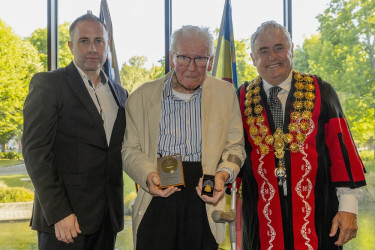
If you can think of something, he can turn it into reality, be it a magic wand for a Fairy Godmother, a gorgeous Cheshire Cat, Olaf the Frozen Snowman, or a two and a half metre crocodile for the back of Captain Hook’s pirate ship.
Over the years his expertise as a stage manager, set designer and builder, and general creative force has been applied to many organisations.
He has worked overseas, particularly in London, and has travelled with many professional companies, including our own Royal New Zealand Ballet Company.
For the last half a century he has been deeply involved in virtually every creative group in Christchurch. The Court Theatre, Showbiz Christchurch (formerly the Christchurch Operatic Society), the Canterbury Children’s Theatre, the Repertory Theatre, and, most recently, the Christchurch Children’s Christmas Parade Trust, all owe him a deep debt of gratitude.
For the last he can be found, almost every day, in the workshop, fixing, mending, creating the floats that are the delight of the children of Canterbury.
A humble man, he is an inspiration to all, at 92 years of age still working tirelessly and selflessly for the enjoyment of thousands.
Plivia Alaba (Emerging Leader)
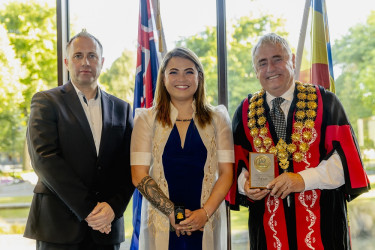
A well-rounded and proactive individual she is known for her unselfish efforts and dedication.
She has been an active worker for so many groups and organisations: Pinoy Cares Canterbury and the Fusion Volleyball Club as well as various other volleyball and basketball groups.
She has provided many hours of her time and given generously of her skills as a graphic artist to the Philippine Consulate, the Philippine Chaplaincy, the Sow-A-Lytel-Seed Muslim Community, the Active Muslim Explorer Group, the Philippine Cultural Migrant Services and many more.
During the Covid-19 crisis she was involved in workshops aimed at helping people cope with the pandemic, with pop-up vaccination clinics, and with social media awareness campaigns.
She has been involved with charitable and cultural organisations and events, particularly the Aliwan Festival, one of the important festivals of the Philippines, of 2022, and currently with the Festival of 2024.
One of the kindest, most generous and helpful of people, she will always go out of her way to help others in need.
Geoff and Margaret Allison
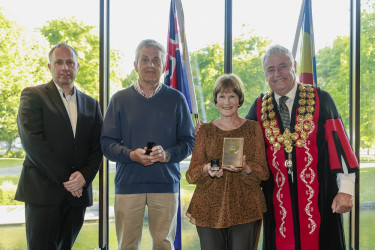
It is an inspiration to artists and poets. Most importantly, perhaps, its role is to establish and maintain collections of plants for scientific study.
By 2019 the unique dahlia collection of the Christchurch Botanic Gardens was deteriorating. Then two experienced and enthusiastic horticulturalists volunteered their services to remedy the plight of the beds.
Although knowing little about dahlias specifically, they set about researching the growth, propagation and maintenance of dahlias, and making contact with the breeders and experts in the wider community.
As a result, over the last five years they have developed and improved the dahlia beds of the Christchurch Botanic Gardens to an internationally recognised level.
And the work continues: during the flowering season they are there most days, deadheading, weeding, cultivating, happy to explain to all who come. During the winter they are there four or five days a week digging up the tubers, cultivating the soil and researching the best fertilisers.
Thanks to their dedication, devotion and countless hours of hard work, they have created the most extensive dahlia collection in public ownership in New Zealand, a truly outstanding achievement.
David Francis Duffy
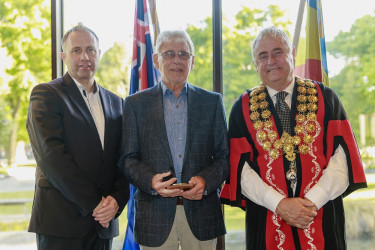
He is passionate about the Richmond/Shirley area, and for decades he has given freely of his considerable abilities to a wide range of community organisations, institutions and projects.
A former athletics coach and gymnastics instructor, he served for many years as a committee member and Secretary for the Christchurch Marathon Clinic.
He has been an integral part of the Richmond Residents’ and Business Association (now known as We Are Richmond) since 2018.
He has been instrumental in helping Shirley Intermediate School look into restoring its two swimming pools so that they can be utilised not only by the Intermediate School, but also by the Shirley Primary School and Paerawa Banks Avenue.
In the aftermath of the Christchurch earthquake he opened his home to local school Principals so that they had somewhere to meet socially, which led to the creation of Ōtākaro Kāhui Ako, a cluster of schools that continue to work together.
He is a community builder, a bridge between community and Council, a gifted administrator, passionate and tenacious in all his pursuits, always seeking the best for others.
Martine Marshall Durieux
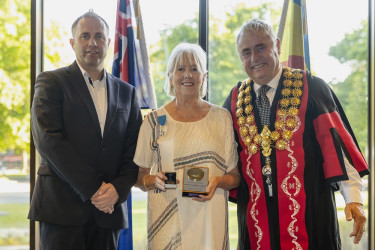
Not only does this enable the student to understand the speech and literature of another nation, it presents a whole new way of viewing the world, for every language is unique.
As a teacher of the French language, she has inspired countless students to drink of the deep well of French culture, broadening their minds, offering a whole gamut of new experiences and opportunities.
She played an instrumental role in the establishment and growth of the Alliance Française in Christchurch, opening the greater community to the French language and cultural events.
As Honorary Consul of France she has provided invaluable services to French nationals visiting and residing in Canterbury.
As Dean of the Consular Corps she has shown exceptional leadership and organisational skills. Nowhere was this skill and dedication more apparent than in the aftermath of the Christchurch earthquakes, when she co-ordinated with other consular representatives to address the needs of the international community in Canterbury.
Her efforts have not only enriched the educational and cultural fabric of Christchurch, but also strengthened international relations and community ties.
We can but say “Bravo! Bien joué, et mille mercis”.
June Leeming
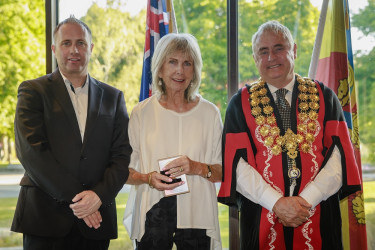
He said to Allison, “I can’t be on any trusts, but I’ll give you my wife.” And what a gift that was!
She joined the Bone Marrow Cancer Trust in 1990, and her vision and leadership have been a driving force behind some incredible fundraisers ever since.
Black tie events and charity auctions were amongst the most successful projects. After one such event it was reported that the largest amount ever raised at a private, home-based auction in Christchurch had been netted.
Originally the Trust had aimed to raise a million dollars for the Bone Marrow Cancer Unit at Christchurch Hospital, but, as she later explained, the transplant unit was never the end of the journey. Patients would need somewhere to stay. So she just kept fundraising, and the result was Ranui House.
In 1999 she moved from being a Trustee to being Patron of the Trust, but she is and never has been a mere figurehead. She has continued as part of the fundraising committee and is still active in the Trusts activities, providing the wisdom that comes from age and experience.
The tens of thousands who have enjoyed the assistance of the trust and of Ranui House give her the most heartfelt thanks for her support, her wisdom, and her incredible generosity.
Binod Parajuli (Emerging Leader)
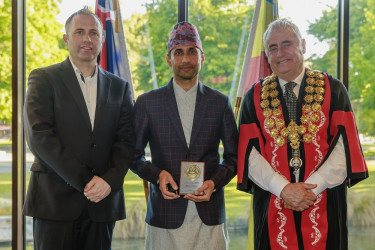
Broadcasting on Plains FM, this weekly show is a crucial resource for the Nepali community in Canterbury and beyond, offering a rich mix of Nepali music, news and information.
The programme’s broad reach has made it a leading voice for Nepali people living, working and studying in New Zealand, its content engaging and accessible to the community, and especially invaluable to the elderly and the recently arrived.
His dedication, proactive efforts and leadership have been instrumental to the success of the Namaste Nepal programme, as well as various other events organised by the Nepal New Zealand Friendship Society of Canterbury.
His ability to connect with people and his deep understanding of the needs of the community have been invaluable assets to the Society, to the Nepali community and the wider community of Canterbury. His dedication to the Society has been a driving force in promoting cultural diversity and inclusion in Christchurch.
By organising and participating in multicultural events, he has not only showcased the ancient Nepali culture and traditions, enriching the City’s cultural diversity, he has strengthened the sense of community, heightened cultural pride, and deepened mutual understanding among the diverse groups of Christchurch.
Vinesh Prakash (Emerging Leader)
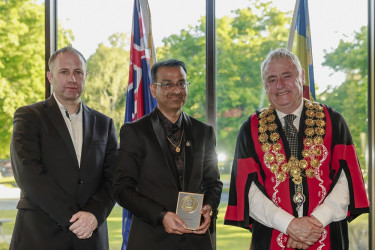
He is also the Association’s Public Relations Officer, in which capacity he has cross-promoted harmony with other organisations, as well as co-ordinating or participating in various successful programmes and events, such as Diwali, Holi, the Fiji Day celebrations, and the Christchurch Christmas Parade.
As Programmes Director for Jalsa Fiji Radio he has become an invaluable source of news and information of especial interest to the Indian community of Canterbury. Through the radio show he has helped to promote many charitable organisations and activities.
He created the Jalsa Talent Show for local entertainers, as well as a show dedicated to legendary Bollywood performers, providing a platform for various local artists to showcase their talents.
He has a gift for bringing out the best in people, which has materially strengthened the connectedness of the Indian community, and has helped the wider community to a better understanding of Hindu culture.
He has heightened the mana of the Indian community, helping them to gain a true essence of belonging in this, their home away from home.
Diana Rosemary Shand
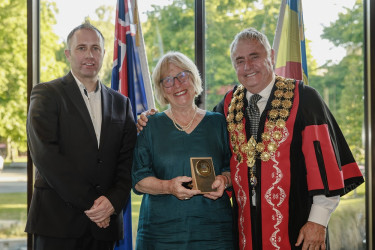
In short, she has devoted her whole working life, and beyond that into her retirement, to public advocacy. The list of the positions, paid and voluntary, local, national and international, that she has held over the decades, is encyclopaedic.
In the 1980s she served as a Human Rights Commissioner responsible for women’s issues.
From 1989 to 2004 she served on the Environment Canterbury Regional Council, responsible for natural resources management, policy development, planning, regulation and monitoring.
From 2009 to 2015 she was a member of the government Land and Water Forum, on the Plenary and Governance Working Group.
The executive of Environment and Conservation Organisations of Aotearoa New Zealand and Chair of the North Canterbury Branch of the Forest and Bird Society.
The International Union for the Conservation of Nature, the University of Canterbury Council, Communities for Climate Protection, the list goes on.
Her gift to Christchurch, to Canterbury, to New Zealand, has been nothing less than a lifetime of dedication, a gift for which no thanks could be too great, no accolade too high.
Victoria Andrews
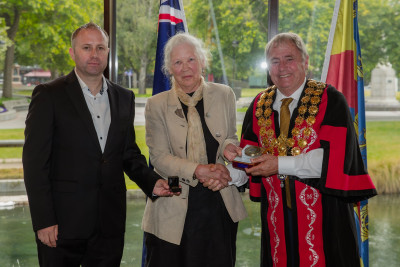
A long-serving member of the Akaroa Civic Trust, she has never been afraid to look authority in the eye, always willing to take on bureaucracy where rules are being flouted, as in the landmark case heard in the Environment Court involving a local landowner and a proposed development that breached the coastal plan.
Victoria always researches her material most thoroughly, and her advocacy is always extremely balanced and well-informed. She has been deeply involved, with the Civic Trust, with matters of heritage and preservation, and has given decades of support to community institutions such as the Akaroa Museum.
She, with other members of the Civic Trust, has made countless trips to the Christchurch City Council to make submissions on all manner of things, from wastewater to the maintenance of sea walls, from freedom camping to traffic management, not to mention the vexed subject of mass tourism and the cruise ship debate.
An articulate advocate for her community, and a fearless fighter for the cause, her dedication has won her the highest regard and deepest respect of the Akaroa community.
Kevin Cole
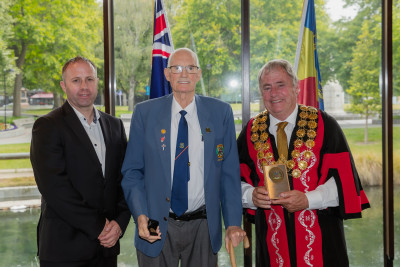
During his tenure he has had to steer the Club through many a crisis, not the least of which have been the Covid-19 pandemic and Christchurch earthquakes.
He has nonetheless weathered these storms to lead the redevelopment team that oversaw the rebuilding of the Club into the multi-million dollar facility that serves not only as the Club premises but services the wider Hornby community.
He has overseen the transformation of the Club into an integral and vital part of the Hornby community, a safe, welcoming family environment that caters for a wide variety of sporting interests as well as supporting and sponsoring local community initiatives.
The Club has sponsored the Hornby Rugby Club, Hornby Cycling and Hornby Rotary for many years, all groups that promote healthy activity and community cohesion.
The Club has provided grants to local schools and other sporting organisations and hosted many charity events which raised money for a multitude of local groups. His legacy will last for decades to come.
Louisa Eades
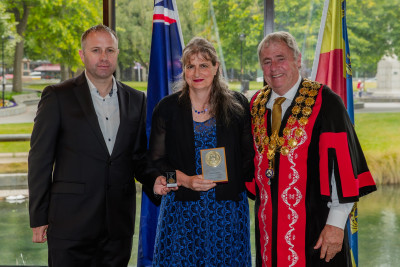
Like any large-scale project and particularly one involving construction, there have been any number of setbacks, delays, and challenges along the way; but Louisa has consistently kept cool, calm and collected, continually encouraging the trustees and the community to keep the project alive.
Louisa has organised fund-raising events (the community has had to raise 50% of the multimillion-dollar cost of the project), community workshops and social gatherings to support the Trust’s work. She has made deputations to the City Council and won the support of Councillors.
As a result of her labours and determination Governors Bay now has its beloved jetty back. Brand new, bigger, better, and built to modern standards; a place for swimming, kayaking, paddle boarding, splashing about, or simply for walking and being close to nature and the water.
It has taken a community to rebuild the jetty, but it took one person to be the cornerstone and driving force of that community effort.
Dave Evans
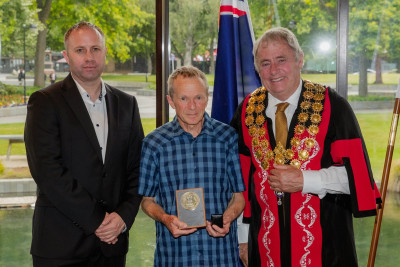
He is an active supporter of many community groups who share his focus. He is one of those quiet background workers who actually drive the many community organisations that we need and admire even though they may not sit on committees or hold a named office.
The Travis Wetland Trust, Forest and Bird, the Christchurch Workers’ Educational Association, the Christchurch Symphony Orchestra and Environment Canterbury, are but a few of those who have all benefitted from his gift of time, energy, and expertise.
He volunteers for the Mahoe-nui Reserve, and for many years has volunteered for the Port Hills Rangers at their community working bees.
He participates in and sometimes helps organise the Forest and Bird Mother of All Clean-up programmes and has volunteered for their Boyle Base trapping project in the Lewis Pass.
Dave participates in the wilding pine removal near Craigieburn, he is currently treasurer of Sustainable Ōtautahi, and he sits on the committee of the Christchurch WEA. The list goes on and on.
Seemingly tireless, always calm and sensible, respectful and much respected, the many organisations that he touches would be much the less without him.
Robert Fleming
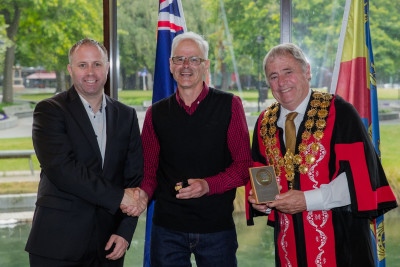
Robert created the Wednesday Wheelies in 2017 as a means of organising group bike rides along safe cycling paths in Christchurch, aiming to boost riders’ confidence and to discover the city’s ever-growing network of cycle ways.
Most of the participants are retired and use the ride for both physical fitness and for social purposes. As the ride has gained in popularity he has trained and supported new ride leaders to conduct groups on different routes, of which he has designed more than 125 variations.
Besides the Wednesday Wheelies, he is deeply involved in the Spokes Canterbury organisation, the annual Biketober Festival of cycling activities, and many other initiatives that all promote cycling in Christchurch and increase the uptake and use of the new cycling infrastructure that has been growing across the city over the last few years.
Robert is a quiet enabler who, through his good nature, strong people and organisational skills, and sheer hard work has made Christchurch a better place to live.
Hayley Guglietta
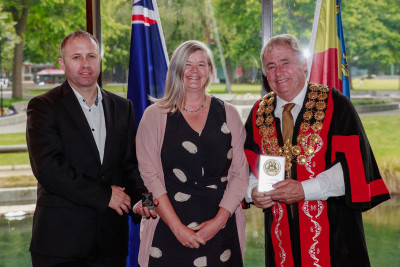
Through her tireless efforts she has consistently championed the cause and worked towards making the vision a reality, but her advocacy extends far beyond the Red Zone.
Hayley is actively engaged in numerous projects across the city, developments such as the Richmond Community Garden, Ōtākaro Orchard, Urban Farm, Avon Ōtākaro Network, the Red Zone Action Team, the Richmond Residents and Business Association, and Envirohub amongst others.
She provides vision and leadership, guiding projects and events towards their goals. She is adept at identifying opportunities, building partnerships and accessing funding.
Her talent for managing relationships, fostering open communication, and resolving conflicts has been key to maintaining a cohesive and unified effort on the part of all those involved in a project or an event.
Whether through direct involvement or overseeing teams of volunteers, Hayley’s hands-on – or, perhaps more accurately, gumboots-on – approach, has ensured that tasks are completed efficiently and on time.
Hayley’s passion, advocacy and volunteerism have enriched the lives of countless individuals and have helped to shape a more vibrant and inclusive community.
Peter Hayes
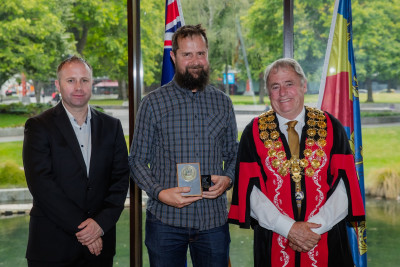
A healthy tree canopy cools urban areas markedly. Trees clear the air of pollutants. Trees retain moisture. Trees bring pleasure to the eye and solace to the soul.
The Green Effect Trust, through its project Trees for Canterbury, has been aware of this for decades, and for the past thirty years Peter has been a staunch volunteer member of the Trust.
Over that period he has attended almost all of the meetings of the Trust, offering support and guidance to the paid staff and the many volunteers who make up the Project.
Nor has he been content simply to guide and advise. He has attended 98% of community plantings, showing up (normally by bicycle) to plant in conditions that range from freezing cold to sweltering, in boggy ground and in stony soil, come wind or rain.
More, he has made every effort to ensure that people at risk – those with intellectual, social or physical challenges - are included in activities. He is a prime exemplar of the selfless dedication of volunteers without whom society as we know it would not exist.
Mr Richard Earl, Chair of the Green Effect Trust, received award on behalf of Peter Hayes.
Katrina Hill
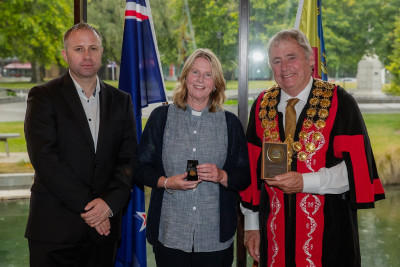
As Archdeacon within the Anglican Diocese she manages St Luke’s, St Faith’s and St Andrew’s Churches but her mission has taken her far beyond her role as a member of the clergy through her work with Te Waka Aroha.
This initiative coalesced twelve years ago in the aftermath of the Christchurch earthquakes as a vehicle to deliver support and resources to a community devastated by the hardships that descended in the wake of that disaster.
The provision of safe, comfortable, and affordable housing has always been and still remains of the highest priority, as does the need to put proper food on the tables of the many families who struggle each day simply to provide the most basic of needs.
Katrina works relentlessly to address these needs and through the agency of Te Waka Aroha provides a space where all may meet for tea or coffee in a safe, welcoming, and non-judgemental environment, where arts and crafts can thrive, and people, religious or otherwise, can come for advice, sympathy and practical support.
She is quiet, humble, and joyful, a bringer of joy and warmth, a leader who inspires and empowers all she meets.
Dr Lynn Lochhead
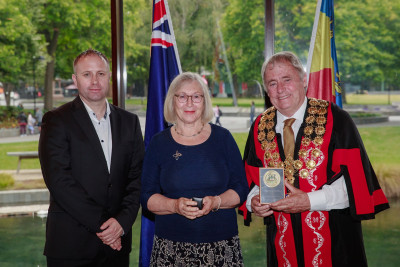
Drawing upon her extensive legal and administrative skills Lynn has spent endless hours preparing and presenting a huge range of reports, submissions and petitions.
She has organised bus trips and heritage car convoys, visits and book launches and other such events. Lynn has researched and developed websites and is actively involved in fund-raising. She is a multi-purpose dynamo, a pearl beyond price.
Alfred (Lew) McIvor
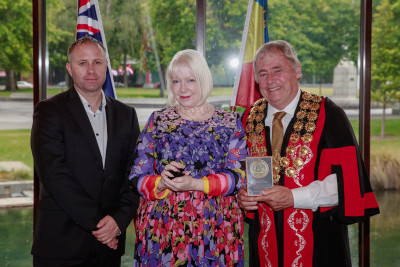
The unit was immediately swamped with patients, most of whom came from beyond Canterbury and therefore needed accommodation. Lew and his fellow trustees, along with Rotarians enlisted through his contacts with the Rotary Club, rallied together and quickly solved the problem.
The answer was Ranui House, an apartment complex that was opened in 1993. Demand rapidly outstripped rooms available, so he was once more engaged in fundraising and negotiations to enlarge the premises.
As soon as this was achieved, they were once again too small to provide for all in need, so the process had to begin again. And again. A forty-three apartment complex is currently under construction and due to open in 2024.
Lew was deeply involved at every stage of the operation. He was also a founding and active trustee of the Bone Marrow Cancer Research Trust which, since 2008, has raised over a million dollars for cancer research projects.
His dedication was inexhaustible, his community spirit exceptional.
Mrs Vonnie McIvor received award on behalf of her late husband Lew McIvor.
David Newton
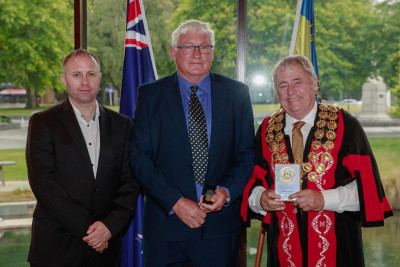
An intelligent and inspiring person, a vibrant and engaging teacher, David is a man of wide vision, phenomenal practical skills, and incredible generosity of spirit.
He co-ordinates and manages all aspects of the Trust, from negotiating places for plantings, collaboration with other like-minded groups, day-to-day logistics, running meetings, liaising with schools, arranging sponsorships, mentoring students and all the other hundred and one tasks that are required to keep the organisation active and humming.
This is a large-scale initiative involving thousands of people, young and old, from all walks of life, growing a forest together.
A huge number of Christchurch schools, both primary and secondary, have become involved as well as numerous other groups such as the University of Canterbury, the Ryman Charles Upham Rest Home, and the Richmond Community Gardens.
David is a humble, hard-working soul with a massive heart and endless energy, a role model to thousands and an absolute asset to our city.
Brian Palliser
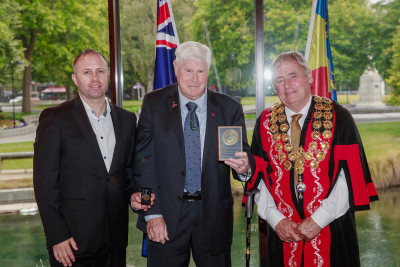
Brian is such a one, and for decades he has given generously of his time, invaluable skills, wise counsel and vast experience to any number of groups, public and private.
As a lawyer with longstanding involvement in international relations, a degree in Earth Sciences and membership of the Royal Society of New Zealand, he is uniquely qualified to advise and mentor.
The list of the organisations with which he has been involved is encyclopaedic: the Public Transport Advisory Group, the New Zealand China Cultural Promotion Foundation, Canterbury University, the NZ Automobile Association, the Independent Citizens’ Association, the Christchurch Seattle Sister City Committee, and the local Chinese Consulate to name but a few.
He stands as a true pillar of the community, and all who have been or are associated with him have felt empowered by the example of lifelong dedication to the cause of Canterbury and New Zealand.
Anthony Powell
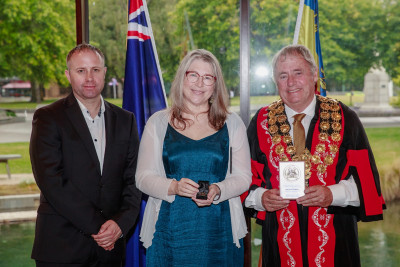
Antz is such an artist, one who has made it his life’s work to document the amazing and eternally mysterious continent that is our near neighbour through a medium that is accessible to all.
Although he makes his living as a photographer, he frequently provides his work free of charge to enhance community related events in Christchurch, and he is a champion for Christchurch’s Gateway City status.
Antz often gives his time, expertise, and resources free for the greater benefit of the Christchurch community.
Along with Antarctica New Zealand he supports the Christchurch City Council, ChristchurchNZ and the Christchurch Antarctic Office through promotional material, with flow-on benefits to Scout groups, schools and business groups, and the University of the Third Age.
Photographer, videographer and film-maker extraordinaire, he gives us a true vision of the wild, that we may truly understand the wilderness, a gift that is beyond price.
Mrs Christine Powell received award on behalf of her husband Anthony Powell.
Dr. Bhola Ram Pradhan
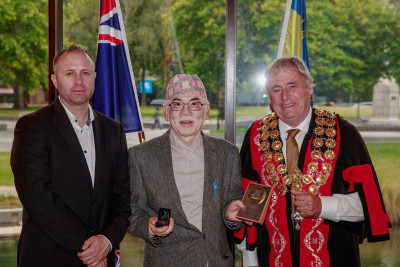
He has helped the Nepali diaspora through a number of leadership roles in different community organisations. He played a key role in conceiving and registering the Nepal NZ Friendship Society of Canterbury to cater to the needs of these communities and guided the Society as its President through its initial fragile years.
The positions that he has held in various community organisations are too numerous to list – Executive Member, President, Treasurer, Chief Election Officer, Co-ordinator – he has filled and fulfilled them all.
Quite apart from his continuing responsibilities in steering the Nepali community, he has assisted in countless other ways such as indexing and archiving books in school libraries, representing the Nepali community in cross-cultural interactions, and being involved in multi-cultural programmes.
Bhola has made monetary donations to many community causes, and his family always provides authentic, homemade Nepali food for community gatherings and fund-raising activities.
The Nepali community of Canterbury would not be where it is now without his many years of stellar service and leadership.
Barbara Price
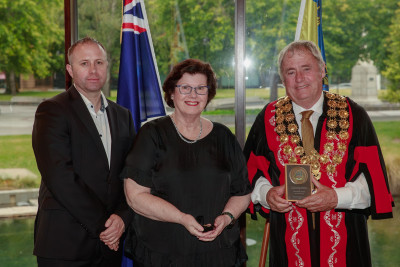
Large sums of money are involved in such projects, and with that a minefield of possible financial, legal, and procedural pitfalls for the inexperienced.
Barbara offered her extensive accounting and management skills to the club at this pivotal time and immediately made a significant contribution to the club sorting out funding applications.
Elected to the volunteer Board in February of 2018, and the Chair the following June, she displayed a singular talent for getting often conflicting parties together and gaining consensus.
Barbara’s advocacy to funding and other agencies to support the delivery of a gymnastics programme to the wider community was outstanding.
She has worked hard to ensure that the club is compliant with complex and changing rules, regulations and legal requirements - work that is far from usual for a Board and definitely over and above that required of the Chair.
Otherwise, and equally importantly, Barbara has been an indefatigable caterer, spending countless hours feeding officials so that the competitions could go on.
The Christchurch School of Gymnastics is deeply privileged to have someone of her skill and commitment as a member.
Don Rowlands
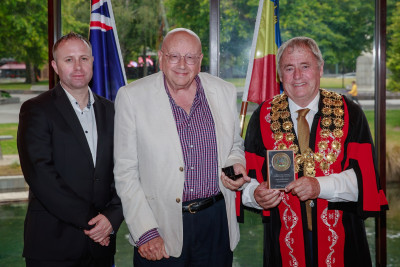
His original and authentic approach across a broad spectrum of problems has brought comfort and practical help to many sufferers on their journey to health.
Don has spent six years in the most demanding of environments, as a volunteer Chaplain in the acute ward of Hillmorton Hospital, and as a volunteer member of St Martin’s Ministry team to Christchurch Men’s Prison.
He has organised and run grief education courses for those who have experienced loss, and a marriage preparation course for young couples learning to deal with conflict management, financial management and family relationships.
Don’s well-grounded and appropriate advice have been met with warm appreciation of his wisdom and life experience, shared with humility and a good sense of humour.
He has organised beginner classes in te reo Māori, and has led Film and Faith discussion groups, addressing difficult issues such as meaning, purpose, justice, gender and sexual identity, and domestic violence.
He has a unique ability to bring people together to tackle difficult matters in a safe and welcoming context while at the same time building new friendships.
Judith Thacker

She has played a significant role in the formation of the Kāhui Korowai, further developing the Museum’s rich cultural heritage. In 2016, when visited by curators from Te Papa, the Museum of New Zealand, the Museum was honoured with the sobriquet of the ‘Te Papa of Canterbury’, for the kaitiaki of taonga of both national and international importance. All in large part due to her good offices.
As an inaugural member of the Board of the Okains Bay Enhancement Society she has been deeply involved in the restoration and maintenance of the historic buildings of the Okains Bay settlement – the church, the store, the cocksfooting shed and others.
Her efforts were key to the on-going development of the camping ground, and the large-scale planting of native species there to remediate the massive damage caused by the Canterbury earthquakes.
Her leadership, planning and enthusiasm have been, and continue to be, exceptional.
Verity Verster
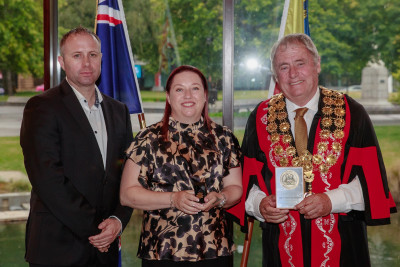
From serving an average of 40 individuals in late 2019, it now serves anywhere between 70 and 90 two course in-house meals to vulnerable members of the community every Sunday evening.
The service not only includes meals but also provides toiletries, quality used clothing and practical advice on dealing with external agencies such as Work & Income, employment agencies and housing providers.
In 2020 Verity established a sister organisation, Mums on Meals (MOM), that addresses food insecurity in Primary Schools. Now she works with a team of eight dedicated volunteers to bring hot, home cooked and highly nutritional meals to selected schools in East Christchurch, schools that do not otherwise qualify for governmental or other agency programmes.
Verity established both social outreach programmes and has led their management, a protracted and sustained effort that has involved a significant amount of her time, effort and considerable management and resourcing skills, not to mention her personal funding.
No mere words can fully eulogise such generosity and dedication.
Vui Suli Tuitaupe
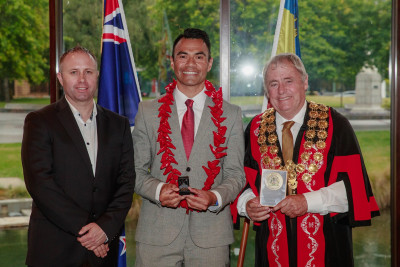
It was then that he realised that it was time to reassess those choices, leading him to join the Les Mills Gym, where, twenty years later, he is still an Instructor.
As a Registered Nurse and a Fitness Instructor, he is passionate about fitness, wellbeing, and health equity, particularly within vulnerable communities.
He promotes physical activity as a form of illness prevention in all his various roles in the community.
He founded the registered charity Moana Va, Navigators of Pacific Pride, a Pacific Rainbow group where he supports and advocates for individuals and families who feel isolated, vulnerable and in need of a safe space. It is the first Pacific Rainbow organisation of its kind in Christchurch, the point of difference with other, similar groups being that it extends support to whole families who struggle to navigate a space that is quite new to their culture and spiritual beliefs.
His communities are the number one focus in his life (after his mother).
He is a superstar in the firmament of the Pacific Community.
The Ōtautahi Māori Wardens
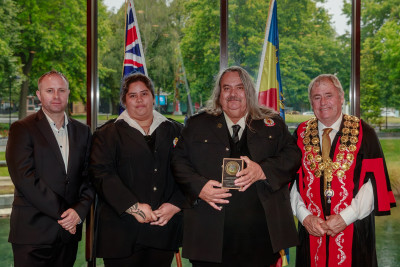
For decades they have provided a service to the people of Ōtautahi that is beneficial not only to members of the Māori community, deploying Māori values to support and protect people of all ethnicities.
They care for young people, the aged, the homeless and the socially and economically disadvantaged. In times of crisis they are there for the people, as in the aftermath of the devastating Christchurch earthquakes, when they fanned out across the city, providing comfort and assistance and sound practical advice wherever it was needed.
During the Covid-19 pandemic they worked with health and local authorities to encourage people to get vaccinated, and supported efforts in welfare and border control.
They work for the relief of poverty, the advancement of education, health, recreation and social welfare, work that, all too often, no-one else wants to do.
Their work is relentless and often thankless. The people of Christchurch cannot give relief from toil that seems to be never-ending, but they can, at the very least, give resounding and unreserved thanks for their truly monumental efforts.
Agnes Abuel-Guda
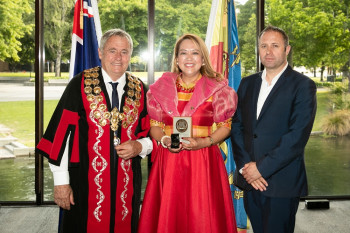 She is a seemingly inexhaustible well of energy, the number of community initiatives with which she is involved seemingly endless.
She is a seemingly inexhaustible well of energy, the number of community initiatives with which she is involved seemingly endless.
She is one of the founders of Pinoy CARES Canterbury, a Filipino group that has been involved in a great number of projects to the betterment of not only the Filipino community but of the wider Christchurch society as well.
She is a volunteer mentor-driver for the Salvation Army, and works for the Student Volunteer Army as a team leader for the distribution of groceries to those isolating with Covid-19.
She was one of the founding members of the Christchurch Philippines Assistance Group that formed after the earthquakes. She is a Multilingual Information Network Facilitator for the Office of Ethic Communities and a member of its Woman-2-Woman Group.
She is a member of the UN Women Aotearoa New Zealand, and volunteers for the Pink Ribbon Society and for the Mental Health Foundation NZ.
At the height of the recent pandemic she assisted in the vaccination campaign, collaborating with different groups to arrange pop-up clinics, and with food banks for the distribution of food supplies to those affected by Covid-19.
Deeply loved by her community for her total dedication and cheerful manner, she is the very epitome of the true community leader.
The Ardour Charitable Trust
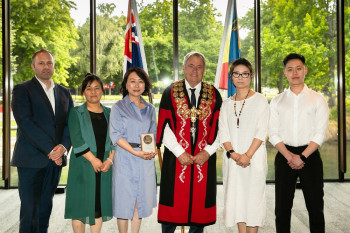 Founded in 2012, the aim of the Trust has been to maintain Chinese culture, to give resettlement support for Chinese migrants, and to promote social cohesion and harmony.
Founded in 2012, the aim of the Trust has been to maintain Chinese culture, to give resettlement support for Chinese migrants, and to promote social cohesion and harmony.
As such the Trust works with various government agencies in New Zealand and China providing a variety of events and activities to enable Chinese Kiwis to reconnect with their rich and ancient cultural heritage.
New migrants are assisted with a range of seminars to help them navigate the maze of new and sometimes very different social institutions such as education, immigration, health and social welfare that they may encounter. The Trust provides an Education System Hub offering guidelines to newcomers on the education and schooling system, enabling children to settle into and integrate with the local system.
Small business owners are supported with seminars explaining the intricacies of government polices, rules and regulations, and compliance requirements.
The elderly, often alone and with little or no English, are especially vulnerable, and the Trust provides classes and activities such as Tai Chi, and social and family events enabling such people to spend time with families and make new friends.
The Trust is a veritable powerhouse, improving the lives of all with whom it comes into contact.
Eleanor Bissell
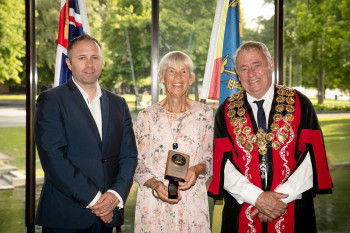 She has been contributing to the restoration of Oruapaeroa/Travis Wetland Nature Heritage Park for more than 25 years.
She has been contributing to the restoration of Oruapaeroa/Travis Wetland Nature Heritage Park for more than 25 years.
She has been a leading supporter and board member of the Travis Wetland Trust for all of that time. In addition to the regular work of the Trust, she can be found every week painstakingly toiling away on hands and knees, caring for the rare and endangered plants of the wetland, some of which would not have survived without her meticulous care.
She is a key member of the small team that organises the monthly Trust working party, and has been since the beginning, and is a much-valued provider of home baking for post-work morning teas.
As a former teacher and long-time Forest and Bird Kiwi Conservation Club leader she takes every opportunity to open the eyes of visiting children and their parents to the wonders of the wetland, both plants and the ‘creepy-crawlies’ that especially excite young, impressionable eyes.
Nor is this all. She participates in other community conservation projects in her own neighbourhood of Huntsbury, at the Ernie Clarke Reserve and the King George V Reserve, as well as initiatives at Lake Clearwater. She is a gem indeed, and worthy of the highest of accolades.
Kenneth Bye
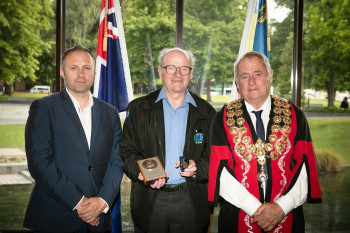 It may be a cliché to make the oft-repeated claim that society as we know it could not exist without the legions of volunteers who work tirelessly in the background to maintain it.
It may be a cliché to make the oft-repeated claim that society as we know it could not exist without the legions of volunteers who work tirelessly in the background to maintain it.
Nevertheless, it is so, and the capabilities of the regular emergency services to give aid and succour to citizens in distress would be drastically reduced were it not for the contribution of groups like the Christchurch South Community Patrol who dauntlessly and doggedly go about their work untiringly – and all too often unnoticed and unthanked.
He has been Patrol Leader of the Christchurch South Community Patrol for the past six years, devoting up to thirty hours a week to ensuring that the Patrol operates smoothly. He has sixty members to coordinate, organising day and night rosters and sorting out all issues that may arise.
He ensures that his patrollers complete a rigorous training programme so that they may be able to competently assist in any situations that they may encounter. He coordinates with the Police and with the City Council, and particularly with Councillors so that he and his team are kept aware of any community concerns.
He can be assured that the community has noticed the work that he and his team do, and that for that they have the community’s unreserved thanks.
The Chinese Culture Association [NZ] Inc
![The Chinese Culture Association [NZ] Inc](/assets/Images/Culture-Community/Community-awards/Civic-Awards-2022/awards-4339__ResizedImageWzM1MCwyMzNd.JPG)
The Chinese Festival [NZ], a subsidiary of CCANZ, organises and coordinates opening ceremonies and performances: arts, photographic and calligraphic exhibitions; Chinese cultural workshops and seminars on calligraphy, Chinese Opera and drama, dancing, singing and much more.
It arranges concerts and performances for the Chinese New Year festivities and participates in events organised by the Christchurch City Council and other community organisations.
The Homeland Programme began during the earthquake recovery period, the concept of ‘homeland’ emerging from the notion that Christchurch residents of all backgrounds were starting to rebuild their homes and lives with more and more confidence.
The Association has managed and continues to manage, to organise events every year, even during the hardest of times.
Come earthquake or pandemic, the team has been able to face the challenges and continue, actively collaborating with the other ethnic groups of Christchurch to construct a truly multicultural environment, for which the wider Christchurch community can truly say, “Well done. Mission accomplished.”
Ted Clarke
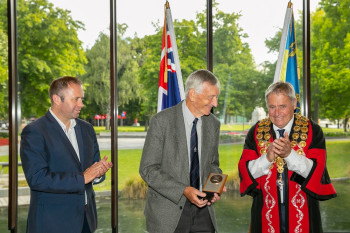 In an age of increasing international tensions of intensities up to and including open warfare, of growing nationalism, and of increasing political and ideological polarisation, the need for dialogue and communication between communities could never be greater.
In an age of increasing international tensions of intensities up to and including open warfare, of growing nationalism, and of increasing political and ideological polarisation, the need for dialogue and communication between communities could never be greater.
The Christchurch-England Sister Cities Committee has for decades been dedicated to just this purpose, and he had been a member of that body for over thirty years, acting as Chairman for most of that time.
As such he has been instrumental in the arrangement of countless initiatives linking the Cities of Christchurch in Canterbury, New Zealand, with its namesake in Dorset, in southern England.
There have been reciprocal visits, local events and promotions, cultural and academic exchanges. Of particular note is the exchange programme between Christchurch’s Linwood College and Twynham School in Dorset.
Without his vision and determination, this significant and most excellent undertaking would never have started, let alone be running twenty-five years later.
His efforts over a period of generations have substantially contributed to the inculcation, here in Christchurch and in Britain, of an internationalism and a cosmopolitan outlook that has always been needful and is more imperative than ever today.
Joshua Davies
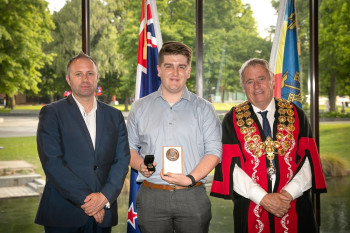 He has been a member of the Christchurch Youth Council since 2018, currently serving as Treasurer. He is involved with St John Youth, helping with the delivery of curricula at weekend camps, and with the training of Cadets.
He has been a member of the Christchurch Youth Council since 2018, currently serving as Treasurer. He is involved with St John Youth, helping with the delivery of curricula at weekend camps, and with the training of Cadets.
He is an active member of the Christchurch Metro frontline ambulance service as a first responder and working as a volunteer community educator, teaching CPR and basic first aid in the community.
He is a YMCA holiday programme leader and a CCN Group member on a panel for Rangatahi Health in Canterbury. During the Covid-19 outbreak, he worked with the Youth Council to arrange a series of information events, which involved working with health professionals to translate information into understandable language and to present it in a format that would be more easily accessible to young people.
He helped to ensure that the Youth Council had robust policies in place the better to protect the team, and was a key player in the organisation and delivery of numerous Covid-19 response initiatives such as vaccination events, and the distribution of care packages to young people in quarantine.
He is a perfect role model not only to all young people but to all citizens regardless of age.
Mark Gerrard
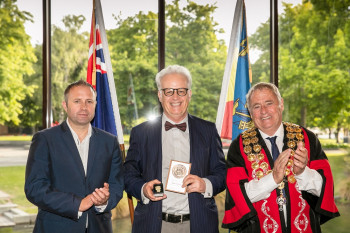 For the last twelve years, he has been the Chair of Historic Places Canterbury, a consortium of heritage supporters, advocates and activists who fervently believe that the retention of the City’s built environment is vital to an understanding of how the people of Christchurch came to be the singular grouping that they are.
For the last twelve years, he has been the Chair of Historic Places Canterbury, a consortium of heritage supporters, advocates and activists who fervently believe that the retention of the City’s built environment is vital to an understanding of how the people of Christchurch came to be the singular grouping that they are.
The cityscape of Christchurch has been going through a period of rapid and sweeping changes ever since the devastating earthquakes of 2010-2011, with almost three hundred buildings lost in the Central City alone.
Through his advocacy and his collaboration with many groups, he has made an incalculable contribution to the preservation and retention of what remains of the City’s built heritage. He has lobbied, made deputations, and given presentations tirelessly. There have been rallies and protests, there have been media releases and interviews, and a social media campaign.
Always he has rejected the ‘demolish and rebuild’ school of thought that would wipe clean the slate of the City’s history, seeking to retain as much as possible, and ensuring that both Māori heritage and the Colonial past are recognised as all elements of history are part of the City’s fabric, a narrative of Christchurch’s on-going journey through time.
Lucy Alice Gray
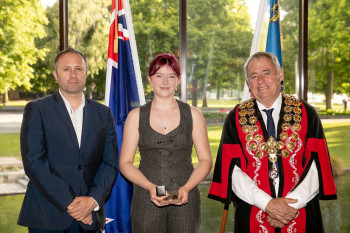 When her journey began in 2017 the future was looking dark indeed. At ten years of age, she first learned of climate change and was so appalled that she decided to do something about it. She began with everyday changes – what she ate, how she travelled, what she bought.
When her journey began in 2017 the future was looking dark indeed. At ten years of age, she first learned of climate change and was so appalled that she decided to do something about it. She began with everyday changes – what she ate, how she travelled, what she bought.
At age eleven she started a group at her local primary school to teach others about climate change and what they could do about it. In that year, 2018, she was invited to consult on the development of a climate change curriculum for schools and she contributed to the development of materials, filmed a resource kit and presented a session during the curriculum trials.
In 2019, she volunteered to be the coordinator for the Ōtautahi School Strike for Climate. She spoke and performed [she is also a talented singer-songwriter] at the event, joined by thousands of people in Ōtautahi and across the country. She and her team went on to organise climate-strike events in 2020 and 2021.
Throughout 2019 and 2020 she advocated for climate action through meetings with Prime Minister Jacinda Ardern and Environment Minister James Shaw, as well as with local council and community groups.
With her to show the way, the future begins to look brighter than anyone might once have dared to hope.
Dr David Miller
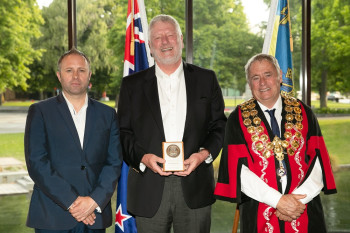 For over twenty years he has provided leadership and guidance to many citizen-led initiatives for the betterment of Akaroa and its environs.
For over twenty years he has provided leadership and guidance to many citizen-led initiatives for the betterment of Akaroa and its environs.
With many skills and a wealth of experience gained in high-level global roles and a background in clinical psychology, he is uniquely well-placed to advise and oversee matters of policy development, systems implementation and organisational governance.
Despite heavy international commitments, he has brought this formidable suite of skills to bear on local organisations. The Banks Peninsula Conservation Trust and the Friends of the Akaroa Museum have both profited materially from his skilful involvement.
He coordinates the Inside Out Akaroa House and Garden Tour, a major biannual fundraiser for the Akaroa District Promotions and the Friends of the Akaroa Museum.
He is actively involved in the Duvauchelle Agricultural and Pastoral Show and is often called upon to chair public meetings as his professional demeanour helps to set the right tone.
His positivity and enthusiasm inspire others to contribute their best to local causes, and his approach to leadership is always inclusive and collaborative.
He is the epitome of the engaged and active citizen, working hard for the community within the wider context of the City and district of Christchurch.
Dr Hero Modares
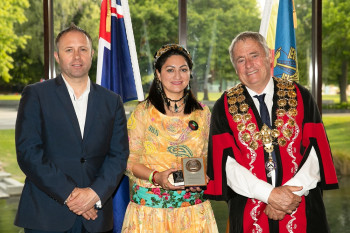 Although in full-time employment since her arrival in New Zealand, she has been actively engaged in representing the Iranian and multicultural communities in Christchurch and the wider Canterbury region.
Although in full-time employment since her arrival in New Zealand, she has been actively engaged in representing the Iranian and multicultural communities in Christchurch and the wider Canterbury region.
She established the first Iranian Society in 2017, acting as its President until 2021. Since then she has organised two major events per year and several smaller events including movie nights and poetry readings.
She has attended festivals where she has run stalls providing information on the Iranian community and has organised and introduced the public to cultural events such as those showcasing Persian music and dance.
She co-ordinates New Zealand’s first and only Farsi language radio programme to which all Farsi speakers – Iranian, Afghani, Tajik, Kurdish and others - can gain access, with its focus on enhancing well-being, connections and social cohesion within the Farsi-speaking community.
Through this programme, she helps them to integrate into a better lifestyle in New Zealand while at the same time keeping their cultural roots alive.
She spends hours every day co-ordinating events, workshops and webinars, applying for funding grants, preparing content for her radio show, and attending various community-related meetings at the Christchurch City Council.
Fortuitously, the English meaning of her given name also defines her nature. She is a true hero of her community.
Bill Nye
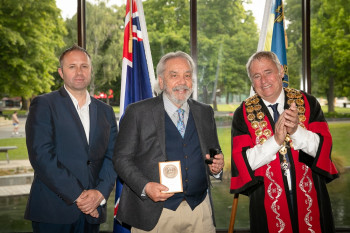 Antarctica, the white continent, has fascinated the adventurous for over a hundred and twenty years. Many who go there flee it, terrified, never to return. Others are captured in a lifelong enthralment. He belongs to the latter category, a retired engineer who spent time on the Ice in the Ross Sea, where he caught the Antarctic ‘bug’.
Antarctica, the white continent, has fascinated the adventurous for over a hundred and twenty years. Many who go there flee it, terrified, never to return. Others are captured in a lifelong enthralment. He belongs to the latter category, a retired engineer who spent time on the Ice in the Ross Sea, where he caught the Antarctic ‘bug’.
Today, and for many years now, he has run the Adventure Bookshop, lately in the Arts Centre of Christchurch. Much more than just a bookseller, it is a hub where people from the Antarctic and mountaineering communities meet to socialise, to learn and to exchange ideas and tales in the company of great literature and like-minded folks.
He organises free events, including exhibitions, receptions, book launches, slide nights and lectures. He never asks for much help, but simply makes things happen, mostly by donating books, or time, or funds to organisations such as the New Zealand Antarctic Society or the Himalayan Trust.
He looks out for the Old Explorers, veterans of Antarctic or mountain exploration, making sure that their achievements are not forgotten.
His contribution to the heritage, culture and education of the people of Christchurch would be very difficult to match.
Ōnuku Rūnunga
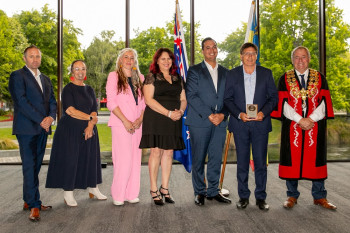
The story of Ōnuku Rūnunga and of Takapuneke has been uncovered, restored and brought back to life, so that it may be shared with a wider audience across Ōtautahi and Aotearoa. It tells of a unique people and of a special place that is woven into the wider tapestry.
It has helped to preserve an essential knowledge and understanding of the past of our region, an understanding that is essential to the creation of a sound foundation for the future.
Young and old have worked for endless hours on this process, the older telling of the importance of Takapuneke, the younger learning the story that they may better develop the next chapter in the on-going tale.
The work of Ōnuku Rūnunga has been deeply significant, for it has raised the profile of early events that, while some of which were not easy to talk about, nevertheless have contributed to the history of this City, this region and this nation, and to Pūrākau o Aotearoa, the ever-evolving Story of Aotearoa.
Jacek Pawlowski
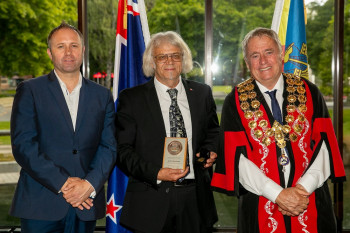
Although Polish settlers began to arrive in the Christchurch area more than a century and a half ago, it was not until the end of World War II that the Polish Club was formed.
Arriving with his family in New Zealand in 1986 he immediately began an involvement with the local Polish community, an involvement that has continued unabated for three and a half decades.
He has been Vice-President and President of the Polish Club and of its successor, the Polish Association of Christchurch. He has helped to organise family trips to Cave Stream or for skiing at Kurow, beach events at Spencer Park and Easter camps at Kenepuru in the Sounds, bonfires, basketball matches and fun days.
He has played a significant role in organising cultural events and providing leadership for the City’s Polish community, and in helping to both preserve and showcase the rich cultural heritage of Poland he has added colour and vigour to the identity of Christchurch.
Project Lyttelton
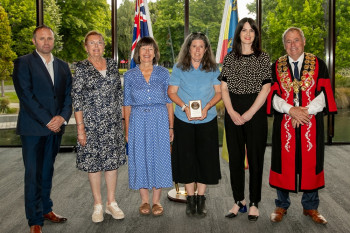
The project’s purpose is sustainability, a simple word for an enormously complex and often contentious concept that in an age when anthropogenic climate deterioration threatens the very existence of life on earth, nevertheless may well hold the key to our survival as a species.
The Project’s activity has been local, but in presenting the Lyttelton Farmers’ Market as a model, its impact has been regional and, indeed, potentially global. It examines everything it does to make sure that nothing has a negative impact on the community and to see how all its activities may be improved.
Waste minimisation, the reuse of items and materials, and compostability are but key foci in a range of strategies that are on display at the Market for all to see, giving the Project’s ethos a far greater reach than just within the Lyttelton community.
It is showing other parts of the City of Christchurch and the Canterbury region what can be – indeed what has to be - done.
Taking that first step is always difficult, but so much easier when there is a helping hand. Project Lyttelton offers that hand.
Erica Austin
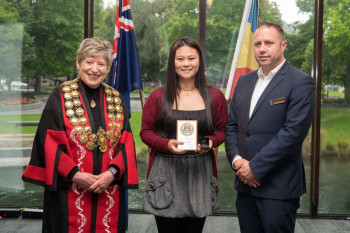 Her involvement in the 2012 FESTA event that opened the Christchurch CBD for the first time since the earthquakes, made her realise that putting her enormous dynamism into helping established entities to do good in and for the City could have a huge impact on future developments.
Her involvement in the 2012 FESTA event that opened the Christchurch CBD for the first time since the earthquakes, made her realise that putting her enormous dynamism into helping established entities to do good in and for the City could have a huge impact on future developments.
To this end she turned down several excellent job opportunities to become a serial volunteer, working for such groups as GapFiller, Pechakucha, TEDxChristcurch and what would later become Te Pūtahi.
Each project she works on sees the production of resources and the creation of relationships between sponsorship bodies and volunteer-only organisations, boards and individuals of interest.
While the specific benefits of her work are unique to each organisation, the overall thread running through them is the strengthening of that organisation while enabling a diverse range of voices to contribute to it on an equal basis.
Her work has benefitted too many groups to mention, and despite constant battles to justify her involvement in high-powered roles and the challenges posed by recent motherhood, not to mention the pressures involved in running her own business, she continues to give of her energies and passion without stint.
She is a creator of opportunities, an opener of doors, a weaver of relationships par excellence.
The Honourable Margaret Elizabeth Austin CNZM
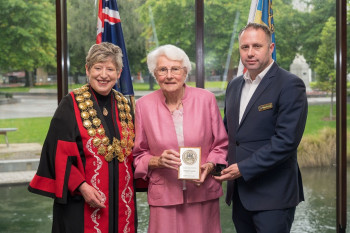 She has dedicated her life to public service, and despite the passing years her mental acuity and support for community causes and activities only seem to increase.
She has dedicated her life to public service, and despite the passing years her mental acuity and support for community causes and activities only seem to increase.
Involved for many years in education at both secondary and tertiary levels, she has taught and administered at Christchurch Girls’ High and Riccarton High Schools, and at the Universities of Canterbury and Lincoln.
A Member of Parliament from 1984 to 1996 and a Minister of the Crown under the Lange administration, she has had a long and honourable career in national politics.
The roll-call of the organisations, large and small, local, national and international, to which she has provided leadership is almost encyclopaedic; the Canterbury Branch of the NZ Educational Administration Society, Community Advisory Group of Pegasus Health, the Aoraki-Mackenzie Dark Sky Working Party, the Chris Ruth Supported Employment Trust, the Arts Centre of Christchurch, the Wainoni-Avonside Community Service Trust, the Royal Society of New Zealand, the United Nations Educational, Scientific and Cultural Organisation to name but a few.
Educator, Administrator, Academic, Politician, Benefactor, all-round warm human being, there are few indeed who can match her achievement, her dedication or her humanity.
Usma Azhar
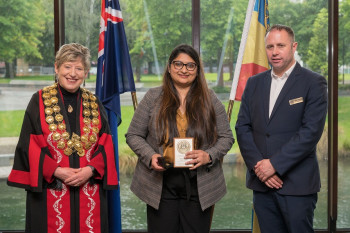 As a full-time PhD student at the University of Canterbury, and the mother of a child with special needs no one could blame her for simply sitting back and resting during her very limited free time.
As a full-time PhD student at the University of Canterbury, and the mother of a child with special needs no one could blame her for simply sitting back and resting during her very limited free time.
Instead, she is known as the one-woman army, so strong is her enthusiasm and determination to work for ethnic communities within Christchurch.
Her achievements in the recent past alone are awe-inspiring. In collaboration with the Canterbury Punjabi association, she has been involved in the Ethnic Communities Skills Build Programme, a project designed to teach additional skills to members of ethnic groups to smooth the pathway in the hunt for jobs and for general career development in a wider community with very different social mores and employment environments to those of the homeland.
She was involved in the Men’s Wellness Programme 2020 and the Students’ Association’s Spring’s Here events. She collaborated with the Canterbury Punjabi Association in the Ethnic Job Fair, with WeCare Aotearoa in a language preservation programme, and in the Canvas Sisters event.
She is rightly proud of the Grand Iftar Dinner.
Remarkable as her achievements of the last four years have been, it is the general consensus that she has only begun, and that the years ahead shall see more and ever greater achievements by a very remarkable woman.
Don Babe
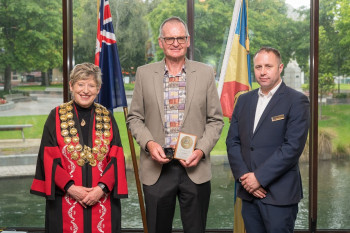 For twenty years and more he has been a tireless advocate for the cycling community in Christchurch and Canterbury, and a staunch proponent of alternative transport.
For twenty years and more he has been a tireless advocate for the cycling community in Christchurch and Canterbury, and a staunch proponent of alternative transport.
For many years he has been the Chair of Spokes Canterbury, a group that seeks to firmly embed cycling within the architecture of urban planning to the extent that cycleways and bicycle access have become included as a matter of course.
He is also Chair of the Christchurch-Little River Rail Trail Trust, which is currently endeavouring to extend the Trail back to Christchurch via Purau, Diamond Harbour, Lyttelton and New Brighton. Over the years he has given countless hours to the implementation of these goals, despite widespread and often deeply held opposition.
The Covid pandemic and the encroaching monster of climate change mean that the world is changing drastically, and show us clearly that the world has to move towards more environmentally friendly ways of moving about, ways that facilitate the use of pedal power and the growing dependence by an aging population on mobility scooters.
Only with leaders who are ready to put in the hard yards despite opposition and obstacles shall the world stand a chance of achieving this goal. He is such a leader.
Michael Bell
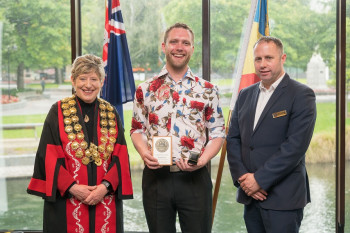 The huge demands on finances and resources that have fallen upon Christchurch and Canterbury in recent years as a result of the earthquakes and other assorted natural disasters have ensured that funding and energy have been largely directed to physical infrastructure.
The huge demands on finances and resources that have fallen upon Christchurch and Canterbury in recent years as a result of the earthquakes and other assorted natural disasters have ensured that funding and energy have been largely directed to physical infrastructure.
The emotional, spiritual and cultural infrastructure of a community are as important as drains and road surfaces to the lives of the citizenry, but this fact is often overlooked.
He knows this only too well, and despite the hardships, has spent years of his life developing the Little Andromeda Theatre as a space where artists can grow and share their work, where a theatre community can come together while supporting, sharing with and learning from each other.
He has also invested much of his time and personal resources into the New Zealand Playhouse and the Orange Studio, affording Christchurch artists and musicians a paid career in the arts (it is frequently forgotten that artists, actors and musicians also need to eat and pay the rent).
His determination and unremitting efforts over the years have provided a milieu for the professional growth of performing artists, stimulated the growth of a uniquely Cantabrian culture, and have brought pleasure and inspiration to thousands of theatre-goers
The Christchurch Guangdong Association
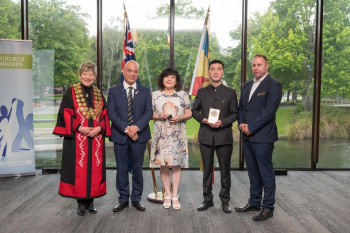 The ink on the Treaty of Waitangi was barely dry when the first settlers from China, specifically from the Southeast Chinese province of Guangdong, began to arrive in New Zealand.
The ink on the Treaty of Waitangi was barely dry when the first settlers from China, specifically from the Southeast Chinese province of Guangdong, began to arrive in New Zealand.
They joined an influx of migrants from around the world who came to Central Otago, all seeking their fortunes in the goldfields. Migrants from Guangdong faced particular cultural isolation, homesickness and an inability to easily travel back to their homeland.
So as the years passed, many returned to China for good. However many stayed, bringing family members and friends from the homeland to become market gardeners, farmers, tradesmen and merchants. Many stayed, cementing the valuable and ongoing contributions of their people to New Zealand.
In 2007, a century and a half after those first arrivals, the Christchurch Guangdong Association was formed, reflecting the resurgence in migration from Guangdong to Christchurch that had occurred since the early 1980s.
Today, the Association has grown into one of the largest Chinese community associations in Christchurch. They are committed to promoting social cohesion, providing a support network for recent migrants to Christchurch, and are often seen volunteering to make a difference to the welfare of our city.
Just last month, they were a driving force behind the success of a Chinese Community Covid-19 vaccination event. Through their diligent and energetic efforts, the Association makes a positive and significant contribution to the very fabric of the unique society of Christchurch.
Ross Gordon Gray
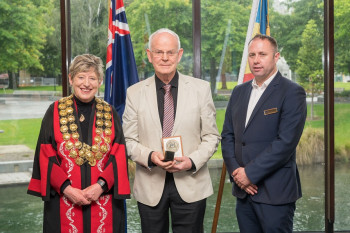 For more than thirty years he has been a warrior for the defence of the built environment of Christchurch. As an artist with an exceptional ability to interpret a visual concept, he is a dauntless champion of the cultural and aesthetic heritage of the City.
For more than thirty years he has been a warrior for the defence of the built environment of Christchurch. As an artist with an exceptional ability to interpret a visual concept, he is a dauntless champion of the cultural and aesthetic heritage of the City.
His first campaign was in 1988 when he successfully led the charge against the proposed ‘Sky Tower’ that was planned for Victoria Square. He has continued battling over the years since, a battle that became virtually a war in the wake of the destruction wrought by the earthquakes of 2010-2011, and his involvement is now almost a full-time job.
He was Deputy Chair of the Christchurch Civic Trust for five years and is currently Chair, while he is also Convenor of the McLean’s Mansion Fundraising Committee.
Further time and energy is expended in his engagement with a number of other like organisations, chairing meetings, writing and presenting submissions, and producing flyers, posters and other material in support of their causes.
To quantify the time he has spent on these many projects would be impossible, as they are all-consuming. Nevertheless no cause is too small, no cause too large, and he is always first to put up his supremely capable hand in support of them.
Yanan [Helen] Huang
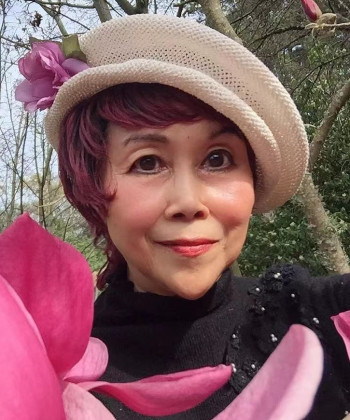 Coming from another country to live in New Zealand can be difficult even for those who come from a similar cultural milieu.
Coming from another country to live in New Zealand can be difficult even for those who come from a similar cultural milieu.
Coming from a land such as China, with a totally different history, culture, society and language, can be overwhelming.
Such people can feel, and are, very vulnerable. They require help and assistance of a very special and very dedicated kind.
She has given her support to Chinese integration to Christchurch and to the Chinese community in Christchurch for several decades and during several crises.
She has worked assiduously with many organisations, such as the Christchurch Multicultural Committee, the Christmas Parade Organising Committee, the Problem Gambling Foundation, the Christchurch Migrants’ Centre, the Christchurch Zonghua Chinese Society, the Christchurch Guangdong Association and others.
During the earthquakes of 2010-2011 she joined the emergency office, working the phones to assist those with limited English and helping with door to door deliveries of food and drinking water, even hosting a number of people made homeless by the disaster.
She is particularly proud of the table-tennis tables erected by the Bridge of Remembrance shortly after the earthquakes, a project of her own devising.
Whatever the need, whatever the emergency, she is always there with practical help, sound advice and heartfelt encouragement.
Emmie King
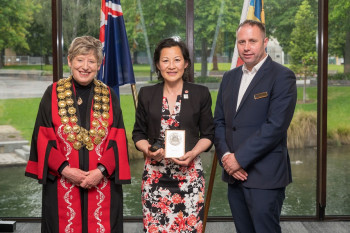 She has been the President of the Canterbury branch of the New Zealand Chinese Association for eight years and an associate for considerably longer.
She has been the President of the Canterbury branch of the New Zealand Chinese Association for eight years and an associate for considerably longer.
As such she is an active, ardent and energetic leader of her community, and a passionate proponent for the preservation of traditional Chinese culture within the New Zealand milieu.
She works unstintingly for the Chinese community, communicating, engaging and networking to ensure that the needs of the community are met.
She is also an active member of the Christchurch Multi-ethnic Council, spending large amounts of her time and energy organizing and supporting many local events and activities for culturally and linguistically diverse groups within Christchurch society.
She leads the Association in its mission to encourage diversity and assimilation within and between the diverse ethnicities resident in Christchurch.
Most importantly, she works tirelessly to promote and preserve knowledge of the rich and ancient Chinese culture within the wider community and especially to ensure that this knowledge is passed on to younger generations of Chinese born in Christchurch.
She supports and empowers ethnic Chinese to feel confident in their identity and unique heritage while at the same time becoming valued and valuable New Zealanders.
Anton Matthews
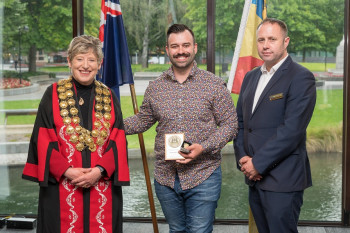 He fervently believes that no one has limits, that everyone has the potential to do anything to which they set their mind.
He fervently believes that no one has limits, that everyone has the potential to do anything to which they set their mind.
But no one can truly achieve their potential until they become aware of who they are, and that awareness only comes with an understanding of whence they came, of the cultural matrix from which they sprang.
To help the many who drift through life without this awareness he established the Hustle Group, an organisation built on the guiding principles of Aroha, Tino Rangatiratanga, Kaitiakitanga, Manaakitanga, Love, Self-determination, Guardianship, and Hospitality.
Hustle Group is a river with many tributaries; an education stream to provide instruction in all matters of tikanga Māori, particularly te reo Māori, and another to organise suitable events. Angitu Charitable Trust is a group within Hustle Group set up primarily to provide opportunities for rangatahi Māori to achieve success as Māori, to deliver resources and education to the wider community and to promote and normalise the use of te reo.
He has devoted the better part of the last decade to this movement, and shows no sign of slowing down. In Ōtautahi and throughout Aotearoa, his mahi is an important contributor to shaping an environment where the speaking of te reo becomes an everyday part of the social fabric.
Diane McMenamin
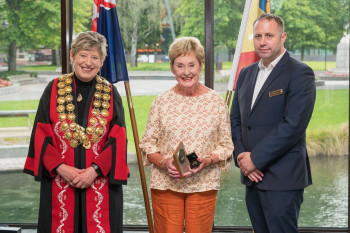 Since her retirement in 2008 from a major Christchurch law firm, she has voluntarily given her time and expertise to the assistance of vulnerable elderly citizens.
Since her retirement in 2008 from a major Christchurch law firm, she has voluntarily given her time and expertise to the assistance of vulnerable elderly citizens.
She acts as attorney, property manager and welfare guardian for those who are unable to understand or lack the capacity to make or communicate decisions about their personal care and legal affairs, and who often have neither friends nor family willing to step up to this duty.
She makes herself available 24/7, visiting people in their homes or in hospital, attending Court sessions when there are any matters under dispute, meeting with social and health care workers, rest home and hospital staff, and with lawyers.
She has arranged funerals on behalf and has attended services where, sometimes and sadly, she might be the only person present beside the funeral director.
She has even taken in clients’ pets when their owners have had to go into care. Many elderly people are quite unaware of and completely bewildered by their legal obligations and safeguards, a recipe, all too often, for deceit and despoilment.
She walks beside these people in their last months, ensuring that their affairs are guarded and their dignity maintained. She is truly a Guardian Angel.
Don Mortensen
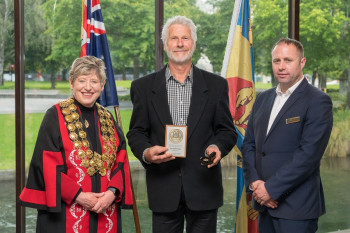 He was approached in the late eighties by the parents of an adolescent who was exhibiting disturbingly harmful sexual behaviours and from this encounter sprang the insight that only by addressing this behaviour could the abuse be stopped.
He was approached in the late eighties by the parents of an adolescent who was exhibiting disturbingly harmful sexual behaviours and from this encounter sprang the insight that only by addressing this behaviour could the abuse be stopped.
Thus was born STOP, a South Island-wide organisation that would provide the services needed to change the behaviour of people who have sexually harmed others, many of whom have experienced their own trauma including sexual abuse.
To the table he brought a unique set of professional and business skills as a social worker, therapist and accountant, buttressed by the robust entrepreneurial nous to provide strategic leadership and organisational stability to his team.
From an initial focus on adult male offenders, the organisation has grown to include programmes for adolescents, girls, and even young children. The programmes have shown to be extraordinarily effective in preventing further harmful sexual behaviour.
For over thirty years he and his dedicated team have been totally committed to this vision of making the community safe from harmful sexual behaviour, an extraordinary feat indeed.
The Natural Magic Pirates
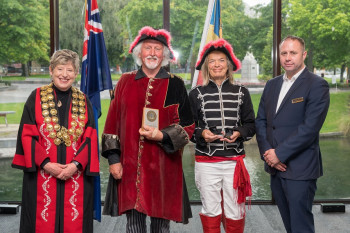 It is almost forty years since first they hoisted the Jolly Roger to the masthead of the good ship New Brighton. Over the decades they have brought fun, music and laughter to countless children and innumerable adults, and without once forcing anyone to walk the plank.
It is almost forty years since first they hoisted the Jolly Roger to the masthead of the good ship New Brighton. Over the decades they have brought fun, music and laughter to countless children and innumerable adults, and without once forcing anyone to walk the plank.
Most Saturdays, weather and lock-downs permitting, the crew gathers in the New Brighton Mall to play and sing for the entertainment of all comers. Unmistakable in their colourful pirate clothes, the eclectic ensemble includes ukulele, guitars, mandolin, trumpet, saxophone and assorted percussion instruments, played with enthusiasm to the delight of all.
Their pirate songs are always well received, especially by the children, as are the many games that they organise. The Parachute Game in particular is always popular.
Sometimes they bring out the traditional Punch and Judy show, another perennial favourite, and every Wednesday they hold an ‘open jam session’ in the Mall to which anyone and everyone is invited to bring an instrument and become part of the enjoyment.
Come fire and flood, earthquake or plague, whenever the gloom of despair settles over the City of Christchurch, they are there to bring laughter and light to all.
Colleen Philip
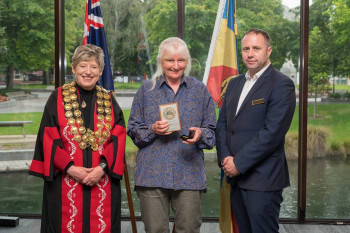 Her decades of service to environmental conservation have seen her engage with many like-minded groups: Sustainable Ōtautahi Christchurch, the North Canterbury Branch of Forest and Bird, the Canterbury Workers’ Association, Orana Wildlife Park, One Voice Te Reo Kotahi and many more.
Her decades of service to environmental conservation have seen her engage with many like-minded groups: Sustainable Ōtautahi Christchurch, the North Canterbury Branch of Forest and Bird, the Canterbury Workers’ Association, Orana Wildlife Park, One Voice Te Reo Kotahi and many more.
As Chair of Sustainable Ōtautahi Christchurch, a position she has held since 2018, she goes well above and beyond any reasonable expectation of this rôle.
Her primary expertise is in environmental matters, but she has long recognised (as many do not) that the environment is not a separate compartment of life but an integral part of a greater whole that also incorporates social, cultural and economic well-being.
She excels at connecting people on a personal level and connecting entire organisations with each other. She links the private sector with the commercial and governmental sectors by forming relationships with people and their organisations.
She excels at bringing people of diverse ages and backgrounds together, creating synergies that raise the potential of the entire community. Long term, her efforts do and will continue to help build a better Ōtautahi that prioritises living wages, water resources, community-centred town planning, and to become a better place for the people, fauna and flora of Aotearoa-New Zealand.
Delia Sipaco Richards
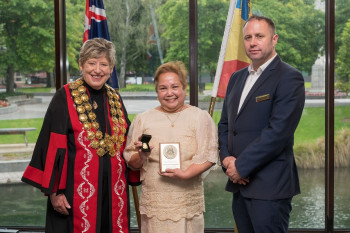 Since arriving in New Zealand in 1988, she has been a very active advocate for the culture and traditions of the Philippines.
Since arriving in New Zealand in 1988, she has been a very active advocate for the culture and traditions of the Philippines.
She founded the Philippine Culture and Migrant Services in 1996, a not-for-profit voluntary organisation that encourages Filipino residents of Christchurch to preserve their identities, language, culture and customs for future generations. More broadly, it provides community services to the Filipino and wider Christchurch community.
A trained dancer and historian, it is small wonder that in its original form the PCMS emphasised the importance of traditional Filipino dance, but over the years the organisation has expanded its purview to include sports and other cultural events as well as the provision of services to support new migrants, giving advice on employment, business, legal rights, and emergency assistance.
This last became of paramount importance during and after the 2010/2011 earthquake events, and over the current Covid-19 crisis.
Since 1996 she has, through PCMS, organised or participated in a host of activities and events such as the annual Philippines Day, the Global Basketball Tournament, the Global Christmas Event, the Christchurch Heritage Festival and many others.
Both the Filipino community and the wider community of Christchurch owe her a deep and abiding debt of thanks.
Layton Ross
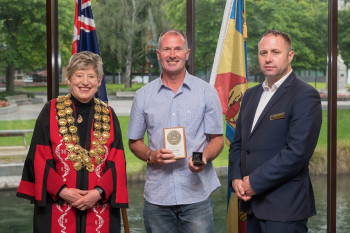 The saying is that one person’s rubbish is another person’s treasure. He had no toys of his own when he was a child, and he long ago determined that no one should have to go through childhood without toys to play with as did he.
The saying is that one person’s rubbish is another person’s treasure. He had no toys of his own when he was a child, and he long ago determined that no one should have to go through childhood without toys to play with as did he.
By day he works in a recycling centre. His evenings for the last two years have been spent repairing, cleaning and repackaging the discarded toys that he rescues during the day and others which he collects from his network of like-minded friends and contacts in the recycling industry.
These are carefully stored and every four months he takes them to Christchurch Community House Te Whakaruruhau ki Ōtautahi. The toys are then given to the approximately one hundred members and associates of Community House to be distributed by the community groups to those for whom toys would otherwise be unaffordable luxuries.
His only rule is that the toys must not be on-sold, his only reward is the knowledge that throughout Christchurch and Canterbury hundreds of little hands have toys to play with, and hundreds of little hearts have something to love and to treasure.
He is a humble man, and many do not even know his name, knowing him simply as The Toy Man.
Cliff Shepherd
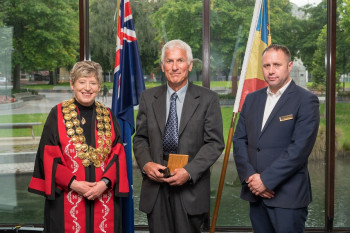 As a father himself and a former teacher and school counsellor, he is well-placed to give advice to all young people but particularly to boys and young men, and especially to young and first-time fathers.
As a father himself and a former teacher and school counsellor, he is well-placed to give advice to all young people but particularly to boys and young men, and especially to young and first-time fathers.
Many fathers do not realise how important they are in the early years of their children’s lives. Traditionally the focus of support has been for young mothers before and after birth. Often the father is forgotten and influenced by entrenched attitudes that insist that men should be ‘staunch’ and not show emotion.
Working with the Kidz Need Dadz organisation, he has been a crucial part of the father, family and community charity support team in Christchurch for nearly twenty years.
While he has served in many ways, perhaps his greatest contribution has been the development of courses on Discovering Fatherhood and Anger Management, that has been of huge value to hundreds of men and young fathers, often while they were in prison.
So effective are these courses that they have been adapted for use in Christchurch Women’s Prison where they are highly recommended.
It takes a village to raise a child, it is said, and as mentor, coach and advocate he is in every sense of the word a kaumatua of that village.
Shaun Stockman
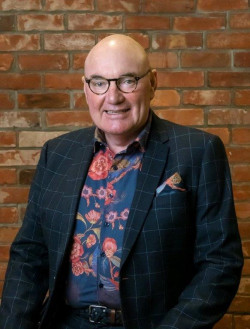
In 2001 he joined the Crossroads Youth With a Future Trust, working with at-risk children and young adults in Aranui.
For two decades now, as Treasurer and latterly as Chair of the Trust, he has helped to oversee the development and implementation of programmes to instil life skills and provide activities that foster positive social interactions, breaking the cycles of brokenness and addiction that are all too common.
His business acumen has help to ensure that the Trust is in a sound financial position with no debt, so that funds can be used for the betterment of Aranui youth and the community as a whole. His work with the Central City Business Association has seen him deeply involved in the restoration and preservation of heritage buildings.
He has been a leading light in many innovative developments, most notably the very successful ‘Pop-up Mall’ which became not only a haven of normality for quake-battered Cantabrians but also a tourist attraction in its own right.
His keen vision, dogged persistence and dedication have helped to ensure that not only do the young people of Aranui have a future to look forward to, but the people of Christchurch have a heritage to look back upon.
The Vegan Society of Christchurch
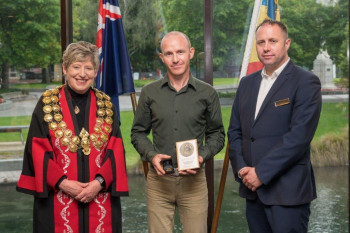 Events of the last two decades have forced the world to face the reality that many of the ways in which we do things will have to change fundamentally, especially the ways in which we produce and consume food. Veganism offers a pathway to that change of hearts.
Events of the last two decades have forced the world to face the reality that many of the ways in which we do things will have to change fundamentally, especially the ways in which we produce and consume food. Veganism offers a pathway to that change of hearts.
Defined as an environmentally friendly way of living that abjures all forms of the exploitation of animals, whether that be for food, or clothing or any other purpose, the mission of the Vegan Society is to support everyone within the wider community who follows or is interested in adopting that lifestyle.
At all times it focuses on the ethical, environmental and health benefits of the Vegan ethos, urging all to explore it and to adopt its principles.
Through regular events such as the monthly night market, potlucks, dinners, singles mingles, the Vegan Camp, the Vegan Ball and many more, it is dedicated to advocacy for the Vegan lifestyle.
As a community-based organisation, its mission includes service to the wider community, as everything it does is open to all. Always it is willing to share information and support as it strives to make a positive difference to society as a whole.
Sardar Faisal Abbas
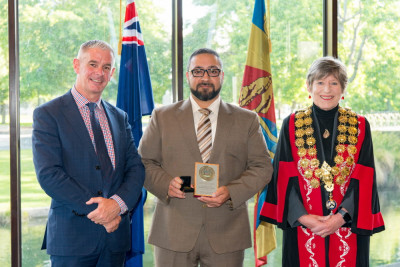 If the heinous attacks that took place at the two Christchurch mosques on 15 March 2019 were intended to sow disruption and strife between the disparate ethnicities and religious communities of Canterbury, they were a spectacular failure.
If the heinous attacks that took place at the two Christchurch mosques on 15 March 2019 were intended to sow disruption and strife between the disparate ethnicities and religious communities of Canterbury, they were a spectacular failure.
Rather, they welded Cantabrians together even more closely. He was there in the thick of it, supporting the Pakistani and wider Muslim communities, helping to liaise between government departments, embassies and the families of the victims.
He looked to the welfare of the stricken, providing material support and succour. In the course of his ministrations, he became aware that the various ethnic communities were disconnected, and that the attack could serve to widen the gap between them.
To bridge the gap he began to use a recently formed cricket team as a focus to bring together sports fans of all ages. The team became a club. He sought the input of youth groups, community leaders, sporting organisations, and bodies such as the Community Activation Fund.
The result was an indoor cricket tournament that drew in teams from nine different ethnicities. Families mixed and mingled, and had fun playing the sport that they love. Tragedy threw them together, but he united them with Cricket.
The Conscious Club
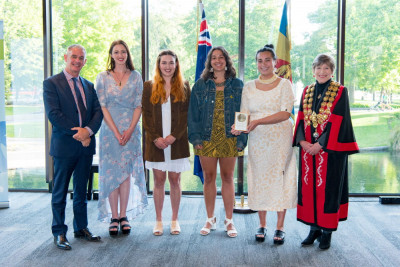 In 2019 four young women set out on a mission to raise awareness of the great and ever-increasing societal, environmental and ethical issues that confront the world today.
In 2019 four young women set out on a mission to raise awareness of the great and ever-increasing societal, environmental and ethical issues that confront the world today.
They are determined to make a sustainable and ethical lifestyle more accessible to the general public and to ultimately improve the health of the planet and all the creatures that dwell here.
The main values of their ethos would be diversity, inclusivity and ethical living all bound together with kaitiakitanga, the Māori term used for the concept of guardianship of the natural world.
They immediately began organising events: a night market with small business owners selling their wares from stalls; a chat series on sustainable living; a Winter Wander arts festival; an arts and crafts market for the benefit of those affected by the Australian bushfires; a clean-up of Sumner Beach; a clothing-for-a-cause event for the benefit of the City Mission, and many more.
They have recently established a headquarters at the Boxed Quarter on the corner of Madras and St Asaph Streets. Here they are able to plan more innovative events such as art installations, workshops, pop-up shops, fashion shows, yoga sessions and markets.
Theirs is the way of the future, and they have shown Christchurch that not only does it make good sense, it can also be a lot of fun.
Dirk De Lu
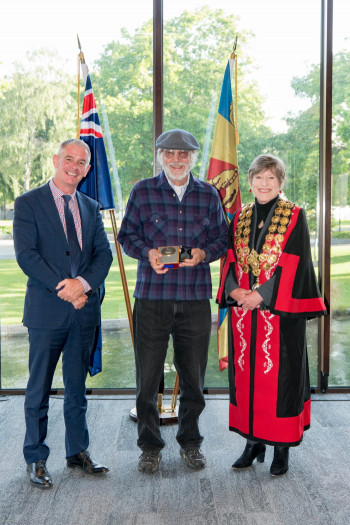 Dirk has been extremely active in the cycling community of Christchurch since he and his wife emigrated here from California in 2003.
Dirk has been extremely active in the cycling community of Christchurch since he and his wife emigrated here from California in 2003.
He has been a member of the executive of the advocacy group Spokes Canterbury since 2007, and was a founding member of ICECycles, Christchurch’s first community bike workshop, providing free mechanical help to local people. He was a founding member of Pop-up Fix-up, a volunteer mechanic for BuyCycles, and the cycling representative on the now-disbanded Active and Passenger Transport Working Group for many years.
Quite apart from cycling, he has volunteered for other causes as well, having served the Quaker Church in various capacities, including finding and adapting a suitable replacement meeting house and providing pro bono bookkeeping and refinancing services to Quaker members.
He has been a stalwart in supporting issues around climate change and the environment for many years.
Despite deteriorating health, he has continued to work with City Council staff and Councillors to provide regular feedback on the City’s ongoing cycleway programme.
Not only has he given significant practical help to the creation of a safer, more bicycle-oriented City, but through his tireless advocacy and relentless perseverance he has helped hundreds of Cantabrians adopt a healthier, more sustainable lifestyle.
June Goldstein
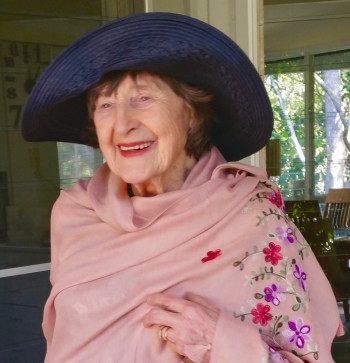 For longer than most of us can think of June gave unstintingly of her time, energy and wide knowledge to her community.
For longer than most of us can think of June gave unstintingly of her time, energy and wide knowledge to her community.
She was the secretary of the Fairleigh Kindergarten, served on the Central Playcentre Committee and was Secretary of the Young Wives at St. John’s Latimer Square.
She served on the board of the YMCA as a member and as Vice President, served on the board of the Civic Trust, and for twenty-five years was Chief Usher and Organiser at the Court Theatre.
Since 1988 her volunteer work was largely on behalf of the Christchurch Art Gallery, although her association with the Gallery began long before.
As a student teacher in 1971, she was seconded to the Gallery on section during which time she became familiar with its running and collections and was involved in the organisation of school visits.
As an officer of the Friends of the Art Gallery, as a guide, and as the instigator of initiatives to make art and artists more accessible to the general public, her contribution to the Gallery was incalculable.
June was informed of her award. She sadly passed away before the presentation ceremony and her award was received on her behalf by her daughter, Anna.
The Fo Guang Shan Temple
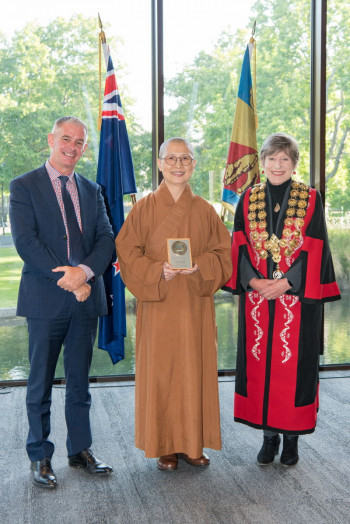 In a world beset by earthquakes, plagues, volcanic eruptions and murderous acts of brutality, what could be more central to the needs of the community than an enclave of peace and tranquillity.
In a world beset by earthquakes, plagues, volcanic eruptions and murderous acts of brutality, what could be more central to the needs of the community than an enclave of peace and tranquillity.
For many years the Fo Guang Shan Temple at Riccarton, under the guiding hand of the Venerable Juexi, has welcomed all who seek harmony in life and freedom from mental stress.
For twenty years it has worked with the NZ Red Cross Meals-on-Wheels service, and with the NZ Police and local schools to organise cultural festivals.
It is the hub of many community initiatives such as art exhibitions, dialogues on Buddhism, and instruction in meditation and philosophy.
For months after the Christchurch earthquakes those thrown upon hard times were provided with free meals and supplies.
The Centre provided free basic medical supplies and toiletries, a free internet service, counselling, and even hosted a temporary office for the NZ Police.
The Centre promotes spiritual well-being, community harmony and intercultural understanding, virtues that are all to often in short supply. All this and more is available freely to all comers, regardless of race, colour or creed.
Marianne Hargreaves
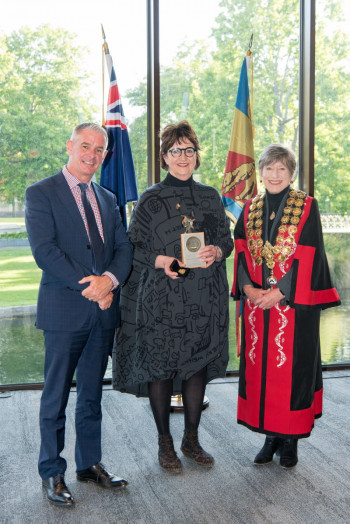 Over at least four decades she has made an exceptionally positive contribution to the development and well-being of the arts in Christchurch and Canterbury.
Over at least four decades she has made an exceptionally positive contribution to the development and well-being of the arts in Christchurch and Canterbury.
She has held various positions within the Christchurch Arts Festival, the N.Z. International Arts Festival and the N.Z. Jazz and Blues Festival.
She has been Arts Advisor to the Arts Centre of Christchurch and has managed the WORD Christchurch Festival. She has long been an active supporter of the Friends of the Christchurch Art Gallery, serving on the Executive Committee since 1999, with two terms as President.
She joined the Canterbury Embroiderers’ Guild in 1986, and through a combination of her own projects and her advocacy for the work of others, she has contributed to the acceptance of textile art as a significant art form.
Most often her contribution has been made as a result of her presence as a positive, practical and proactive member of the arts community.
She has enthusiastically undertaken voluntary governance positions and in so doing has made a hugely valuable contribution to the health of the arts in Christchurch and Canterbury.
She is an advocate, an ambassador, an enabler, an appreciator, and an essential part of what holds the arts community of Canterbury together.
Jumayah Haji Ahmad-Jones
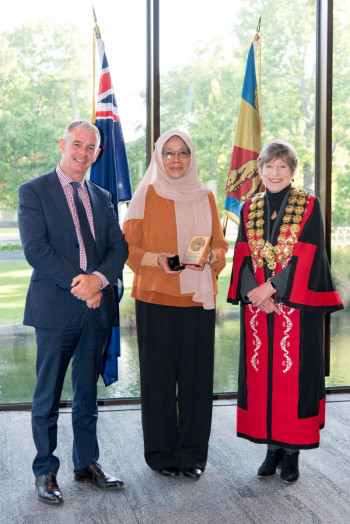 Jumayah has been engaged in activities within the Muslim community of Christchurch for many years, but the tragedy of March 2019 gripped the entirety of Canterbury and New Zealand, giving her work an unprecedentedly broader scope.
Jumayah has been engaged in activities within the Muslim community of Christchurch for many years, but the tragedy of March 2019 gripped the entirety of Canterbury and New Zealand, giving her work an unprecedentedly broader scope.
She was involved in the establishment of the Nawawi Centre, helping to equip a new generation of thinkers and doers with the means to play a significant role in the response and recovery of the community in the aftermath of the tragedy.
She became a regular attendee at and a contributor to the INFORM network, and has recently been appointed to the Christchurch City Council’s Multicultural Advisory Group.
She was instrumental in the Tributes of Aroha exhibition to mark the six-month commemoration of the mosque shootings, to Operation Ted, the gifting of Teddy Bears left on tribute wall to Muslim children across the City, and to the Women’s Pamper Day for the widows and victims of the shootings.
But her influence has extended far beyond Christchurch.
A woman of remarkable calmness at all times, her interactions with international visitors over an extended period have presented a calming, healing public face of the overall response to the mosque tragedy to the whole world.
She is indeed a taonga of the City.
Karlena Kelliher and Sands Canterbury
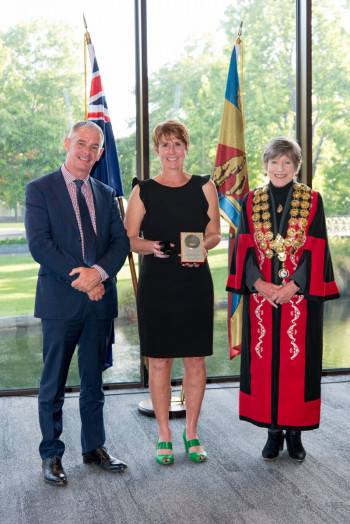 The loss of a baby through miscarriage, stillbirth or medical termination is a uniquely agonising hurt that can cause substantial emotional pain to the bereaved survivor, all the more poignant as this is a hurt that is often overlooked by wider society.
The loss of a baby through miscarriage, stillbirth or medical termination is a uniquely agonising hurt that can cause substantial emotional pain to the bereaved survivor, all the more poignant as this is a hurt that is often overlooked by wider society.
But help is at hand. An active member of the Sands Canterbury organisation for ten years and Chairperson for the last eight years, she has given countless hours of her time and considerable amounts of her own money to the assistance of those who have suffered the loss of a baby.
She prepares and provides up to fifty care packages and memory boxes per month, items that are gratefully received as few people expect such a tragedy and even less make provision for it.
Every month she writes a piece for the Sands Canterbury newsletter, always something relevant and engaging.
She provides phone and email support for anyone in Canterbury who might need someone to talk to about their loss.
A warm and wonderful person, she personally provides so much of the care and compassion that is given by Sands Canterbury.
She cannot make it better, but she can walk beside those who grieve, giving them the huge solace of knowing that they are not alone.
George Lajpold
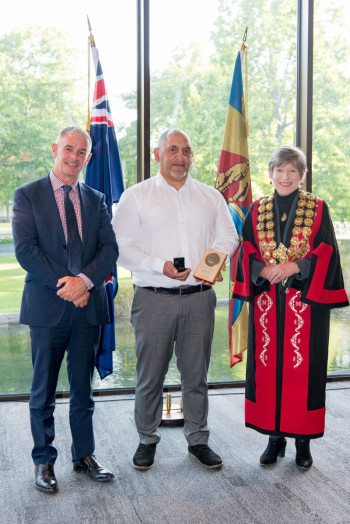 Few could be unaware of the rise of alcohol-fuelled antisocial behaviour at club-level rugby league games throughout Canterbury, particularly on the sidelines and in the changing rooms and car parks after the match.
Few could be unaware of the rise of alcohol-fuelled antisocial behaviour at club-level rugby league games throughout Canterbury, particularly on the sidelines and in the changing rooms and car parks after the match.
Sports Clubs had expressed deep concern over their lack of authority to manage troublemakers and were dissatisfied with the lack of support they received from community agencies in this matter.
Members were leaving in disgust.
Something had to be done and one man led the charge. Working with Canterbury Rugby League, Sport Canterbury, the Canterbury District Health Board, the NZ Police and the Christchurch City Council Relicensing Group, he developed a strategy that clarified the underlying problems and encouraged a coordinated response from all concerned to ensure that clubs were fully aware of the application and management of the appropriate legislation.
They were empowered to support young people and to challenge harmful social norms.
Changes were made to the City Council Licensing By-laws to ensure that they had the legal backup that they needed.
He recognised the role of sport in advancing conversations about anti-social behaviour and as a result, he has transformed the Canterbury sporting landscape by introducing the idea that community wellbeing starts on the sidelines.
Steven Ma
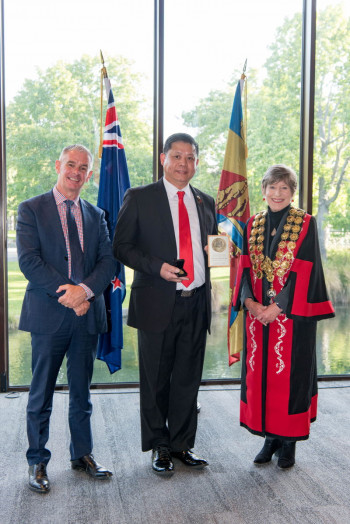 Originally from Guangzhou Province in China, he has been resident in Christchurch for more than thirty-three years.
Originally from Guangzhou Province in China, he has been resident in Christchurch for more than thirty-three years.
As the long-serving chair of New Zealand China Exchange Inc., and leader in Christchurch Chinese community public welfare undertakings, he has been involved in many projects and promotions invaluable to the development of the local Chinese Canterbury community as well as the wider population.
He organised a group of representatives of local businesses to visit the Trade Fair in Guangdong, promoting valuable commercial ties between the two economies. He arranged for groups of young Cantabrians of Chinese extraction to attend Chinese language courses in China, the better to promote mutual understanding between the two communities.
After the 2011 earthquakes, he was instrumental in the organisation of the ‘Rebuild our Homeland’ event that secured much-needed donations to the Christchurch Red Cross.
He organised groups of Christchurch tourism professionals to participate in Tourism Expositions in China, building invaluable contacts for them with their Chinese counterparts to the greater prosperity of Christchurch.
Over the last three decades, besides building and running his own business, he has worked assiduously to promote the cause of multiculturalism in Canterbury, building community harmony and business development, and organising cultural exchanges and tourism promotions.
Stephen McPaike
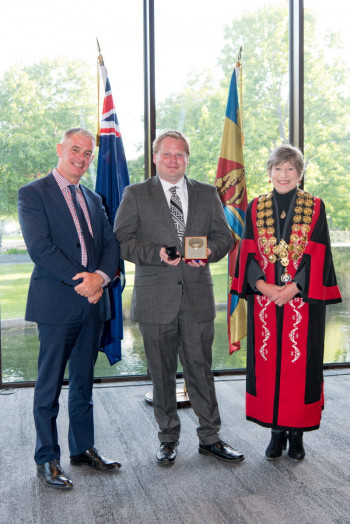 The problems inherent in an ageing social housing stock are widespread and, often, seemingly intractable.
The problems inherent in an ageing social housing stock are widespread and, often, seemingly intractable.
A lack of modern efficient heating is a particularly serious concern, which can lead to ill health and its attendant miseries and costs, as well as emotional and mental distress.
Residents all too often feel powerless, feeling that their voices cannot be heard, but from time to time there arises one who can make his voice heard.
Despite working full-time and caring for a seven-year-old, Stephen has put in endless hours advocating for his fellow social housing residents and not just in the search for modern, efficient heating.
Always cheerful, he is ever ready to help in so many ways large and small, such as collecting medications for residents who are unwell.
He has a superb talent for resolving problems and confronting issues, but his crowning achievement must be the installation of heat pumps in the residences across the Council’s social housing portfolio, leading to residents’ improved well-being, better health, better morale and cheaper heating.
The New Zealand Spinal Trust
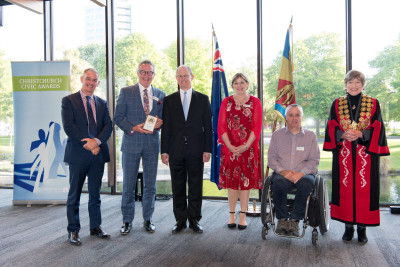 It took a fall from the porch roof for the late Professor Alan Clarke, Dean of the Christchurch School of Medicine, in 1991 to fully realise how under-resourced the rehabilitation process really was.
It took a fall from the porch roof for the late Professor Alan Clarke, Dean of the Christchurch School of Medicine, in 1991 to fully realise how under-resourced the rehabilitation process really was.
The result was that two years later and now confined to a wheelchair, he established the New Zealand Spinal Trust, which is now recognised as a world leader in its field.
Working largely out of the Burwood Spinal Unit, it provides services and programmes free of charge to anyone suffering from Spinal Cord Injury anywhere in New Zealand.
The Trust’s immediate mission has always been to improve the quality of rehabilitation and the enablement of independent living for all those with SCI.
The Vocational Rehabilitation Service provides specialised education, career planning and work support to both the newly injured and those who have been living with SCI, often for long periods.
The Peer and Whanau Service provides the injured and their families with calm reassurance on the perspectives of a radically changed lifestyle, connecting them with others in a similar situation.
The Resource Centre is a world-class one-stop shop with a unique and comprehensive collection of resources on disability and rehabilitation.
The Trust and all its members, individually and collectively, have made a gift to New Zealand that is beyond price.
Maria Romero
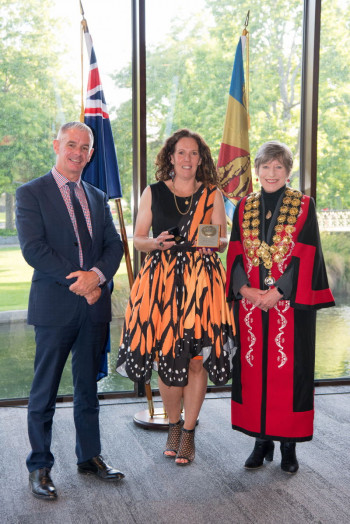 One of the most significant insights to be gained from the study of the natural world of which we, as humans, are but one part, is that everything is connected.
One of the most significant insights to be gained from the study of the natural world of which we, as humans, are but one part, is that everything is connected.
Life on earth is a vast web of interlinked and interdependent strands, the loss of even one of which can have far-reaching and potentially catastrophic consequences.
To educate children to the importance of this simple but often overlooked fact, she set up Butterfly Musketeers in 2013.
She travels throughout New Zealand from late spring to early autumn to educate people about the gorgeous Monarch butterflies and their importance to our food chain.
During the Monarch butterfly season, she visits two schools or preschools every day, five days a week and gives talks to community groups and organisations in the evenings.
She propagates swan plants to give away to schools and organises wonderful children’s birthday parties complete with spectacular Monarch butterfly costumes.
Through her unique efforts she leads children to an understanding not only of the beautiful Monarch butterfly and its place in our ecosystem, but to an understanding of the increasingly threatened wider environment, our place in it, and the importance of sharing it on equal terms with all the other inhabitants of our planet.
Bariz Shah
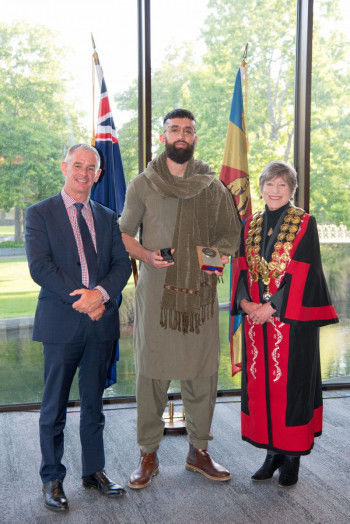 As a refugee in a new land with a different language and very different customs, his early years in New Zealand were a struggle.
As a refugee in a new land with a different language and very different customs, his early years in New Zealand were a struggle.
He dropped out of secondary school, slowly sinking into a quagmire of drugs and alcohol. But within the unprepossessing bud there lurks a magnificent flower, a flower which began to blossom with a trip to Afghanistan in 2012.
Back in Christchurch, he began to make changes, dedicating his life to helping others, successfully gaining University Entrance and undertaking a course in Engineering at the University of Canterbury.
He became involved with World Vision, who quickly perceived his leadership potential, and in 2019 he was elected President of the University of Canterbury Muslim Students’ Association.
He has been involved in numerous programmes and initiatives aimed at empowering young people, giving them the focus to help both themselves and others less fortunate.
He has established the Good Addict charity organisation, and self-defence classes for women and children who felt vulnerable in the wake of the 15 March attacks.
He has acted as a community advocate, speaking to the news media after the attacks, always presenting a positive narrative.
He is an outstanding and tireless leader of his community and an example to which all young people may aspire.
Margaret Sharkey and Allan Pritchard
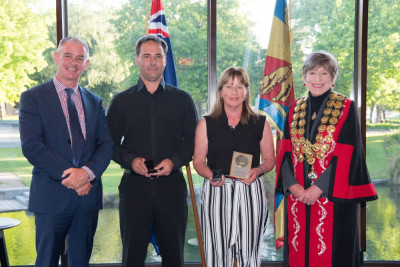 One of the worst nightmares of those who care for loved ones who suffer from cognitive impairment conditions such as autism or dementia is that their charge may wander away and disappear.
One of the worst nightmares of those who care for loved ones who suffer from cognitive impairment conditions such as autism or dementia is that their charge may wander away and disappear.
With more than four decades of experience in emergency services – Red Cross, LandSAR, Civil Defence and Victim Support – between them, they were well placed to bring relief.
In 2010, the successful search for a missing boy who suffered from autism inspired them to create what would become the WanderSearch Canterbury Charitable Trust, a tracking device loan bank that enables anyone who needs the protection provided by such a device to have one regardless of ability to pay.
Demand for this service quickly became a flood that almost overwhelmed them, but such was their passion and commitment that they soldiered on despite the difficulties.
At first the costs of equipment, travel and labour were borne by the couple themselves, but the establishment of the Trust in 2016 enabled them to apply for funding, although they still gave endless hours of time.
In December of 2019 the couple decided to pass the torch on to others, but their legacy continues, bringing ease of mind to the afflicted and their loved ones. The work they did was pure gold.
Noeline Tennant
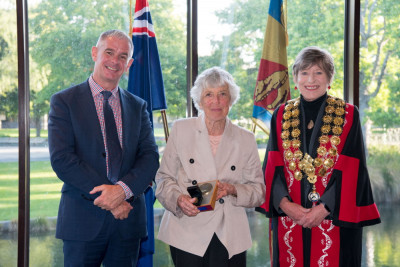 Noeline has been a loyal member of SPELD since she joined in the Wairarapa in 1978, relocating to the Christchurch branch in 1993.
Noeline has been a loyal member of SPELD since she joined in the Wairarapa in 1978, relocating to the Christchurch branch in 1993.
She served as a teacher and tester in Christchurch for the next twenty years, during which time she was President of SPELD Canterbury.
She helped to organise three SPELD conferences in Christchurch and contributed to and ran fundraising stalls for the local group. For many years she acted as convenor of Canterbury’s teacher training courses.
When the Ministry of Education required the specialist courses to be registered with the NZ Qualifications Authority, which was necessary for the organisation to continue its work, she spent endless hours working through the mountain of paperwork involved.
She then took responsibility for the first two NZQA audits, another massive and time-consuming task. It would be impossible to fully express the benefits that she has brought not only to SPELD Canterbury, but to also the organisation nationally.
Through her testing and teaching, she has helped countless Cantabrians and other New Zealanders to overcome their dyslexia, enabling them to secure jobs and become fully contributing members of society.
Even more importantly, she has given them a sense of self-worth, with all the emotional well-being that that brings.
Kalim Ullah
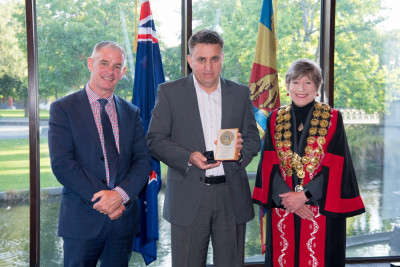 The mosque attacks on 15 March 2019 did much more than end the lives of the fifty-one worshippers who died that day.
The mosque attacks on 15 March 2019 did much more than end the lives of the fifty-one worshippers who died that day.
The victims of this horrendous event number in their hundreds, for they are also those who were injured, many so severely that they shall never fully recover.
They are those who lost loved ones, and whose grief at their loss can never be fully assuaged.
As President of the Pakistan Association Kalim was an authoritative voice for the guidance of the families of the victims at a time of extreme crisis, many of whom were left helpless, without money, and without the knowledge to go about such ordinary things as getting bank accounts, or driver’s licences, or any of the myriad details that mainstream New Zealand society takes for granted.
He immediately began to help liaising with victims and those who flocked to give assistance, seeking donations, providing food and accommodation for victims, arranging transport, delivering groceries, helping with the disbursement of funds, even helping with household chores, all the while gathering information for the High Commission of Pakistan, and for the Royal Commission of Inquiry into the incident.
In a thousand different ways he has proved himself to be a pillar of his community.
Honghuan (Wendy) Zhang
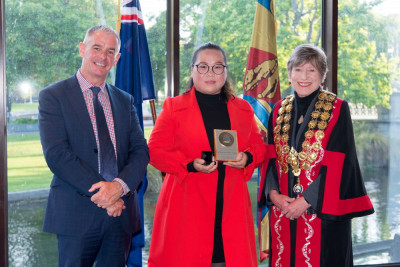 Wendy is well known to the Chinese community of Christchurch as an active and energetic teacher of Chinese culture, language and performing arts.
Wendy is well known to the Chinese community of Christchurch as an active and energetic teacher of Chinese culture, language and performing arts.
She works through the Zhong Hua Qing Cultural and Arts Education Centre, an educational facility for the second generation of Chinese children as well as international students, providing instruction in Mandarin, dance, painting, calligraphy and folk music.
The institute provides an invaluable window for the younger generation of children to build a relationship with their ancestral country and its ancient and immeasurably rich cultural heritage.
Quite beside this, she has set up a community service hub for the assistance of new migrants who need help settling into their new home, and is heavily involved in victim support for Chinese travellers and tourists who are injured, for example in road accidents, while visiting.
She works closely with numerous authorities, including the City Council, the Police, the Citizens’ Advice Bureau, and the departments of Inland Revenue, Work and Income, and Immigration, as well as Christchurch Hospital and health professionals.
She is a boon and a blessing to the Christchurch Chinese community and the many individuals who have sought her generous assistance.
She has done far more than most to present Christchurch as a warm and welcoming place to visit and to live.
Kim Cyril Blackmore
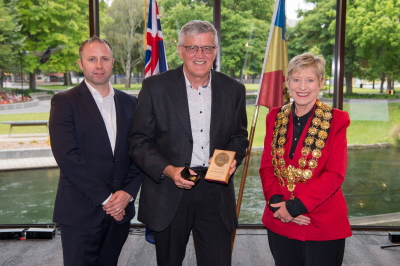 Over many years the very successful Stedfast Brass has brought pleasure to thousands of music lovers. Their performances are many and varied, ranging from their annual 'loyal variety' concert to the Summertimes programme concerts, school fairs, rest homes, garden parties and church services. Their playlist covers genres from pop songs to jazz standards, classics to golden oldies and marches to sacred songs. The key to the success of the band is the man who wields the baton, the Conductor and Musical Director. He is passionate, enthusiastic and a virtuoso musician in his own right.
Over many years the very successful Stedfast Brass has brought pleasure to thousands of music lovers. Their performances are many and varied, ranging from their annual 'loyal variety' concert to the Summertimes programme concerts, school fairs, rest homes, garden parties and church services. Their playlist covers genres from pop songs to jazz standards, classics to golden oldies and marches to sacred songs. The key to the success of the band is the man who wields the baton, the Conductor and Musical Director. He is passionate, enthusiastic and a virtuoso musician in his own right.
For over twenty years, through his leadership and dedication, he has encouraged the ensemble of over thirty musicians to perform to the very best of their abilities, but he is far more than just the leader of the band. He gives individual tuition to new or less skilled members. He arranges performances, ensuring that a suitable programme is prepared to provide an enjoyable experience for both audience and players alike. He provides pastoral care to members, visiting the sick, and listening to cares and concerns.
His contribution to the cultural and spiritual life, not only of his fellow musicians but also of other bands and of community groups in Christchurch, is and continues to be incalculable.
William (Bill) Cowen
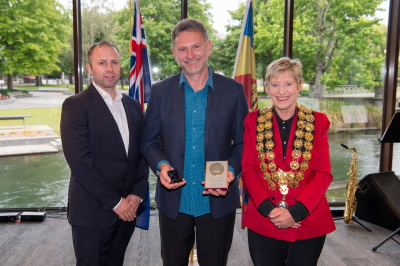 He joined Christchurch Technical Association Football Club as a playing member in 1979. By 1982 he was working as a volunteer fundraiser, and by 1985 he was facilitating the introduction of a part-time paid fundraising and marketing role. By 2002 he was promoting the formation of a regional football entity to represent the clubs of Canterbury. Then came the 2010 and 2011 earthquakes: club buildings were damaged, grounds destroyed and members lost jobs and were forced to move away. He became a key driver of the amalgamation of the Cashmere and Woolston clubs which saw the birth of Cashmere Technical.
He joined Christchurch Technical Association Football Club as a playing member in 1979. By 1982 he was working as a volunteer fundraiser, and by 1985 he was facilitating the introduction of a part-time paid fundraising and marketing role. By 2002 he was promoting the formation of a regional football entity to represent the clubs of Canterbury. Then came the 2010 and 2011 earthquakes: club buildings were damaged, grounds destroyed and members lost jobs and were forced to move away. He became a key driver of the amalgamation of the Cashmere and Woolston clubs which saw the birth of Cashmere Technical.
With the club structure in place he then began a relentless campaign to secure grounds and funding and, despite setbacks, has ensured that Technical continues to grow and operate, and attract a wide range of new members. A visionary and a risk-taker, passionate and persevering, he lives and breathes football. He is ahead of his time, introducing a strong and ever-growing element of female participation in football at all levels. He is Mr. Technical and from out of disaster he has created an entity that is the envy of New Zealand football clubs, and a sturdy and lasting legacy for the benefit not only of his club but for all of Canterbury.
Christchurch Theatre Workshop SING group
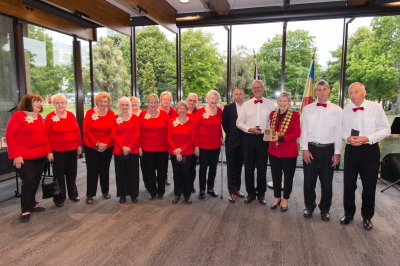 They were a group of ex-pat British who came together for companionship and to share the good old English tradition of the Pantomime with their new community. That was in 1976, and over the years the organisation evolved and broadened its avocation. In 2000 the society formed a group for the purpose of mounting sing-along concerts, primarily for the elderly residents of rest homes and retirement villages. Nineteen years later, the group is still going strong despite the loss to the earthquakes of 2010-2011 of their primary performance venue, the Caledonian Hall.
They were a group of ex-pat British who came together for companionship and to share the good old English tradition of the Pantomime with their new community. That was in 1976, and over the years the organisation evolved and broadened its avocation. In 2000 the society formed a group for the purpose of mounting sing-along concerts, primarily for the elderly residents of rest homes and retirement villages. Nineteen years later, the group is still going strong despite the loss to the earthquakes of 2010-2011 of their primary performance venue, the Caledonian Hall.
Two concerts are presented every other month, one in Christchurch and one in Rangiora. The audience gets an afternoon of entertainment, a souvenir songbook from which to sing, a guest artiste, raffle prizes, and afternoon tea. The performance, however, is simply the end product. Huge amounts of time and energy are deployed into its creation, involving the arranging of venues, programmes and audiences, organizing raffles, teas, guest artistes, transport, costumes and props, as well as countless hours of preparation and practice. All this by volunteers. Over the years they have provided a superlative forum for like-minded people to socialise and sing, but more importantly, they have brought joy and entertainment to thousands of Cantabrians.
Jenny Gillies
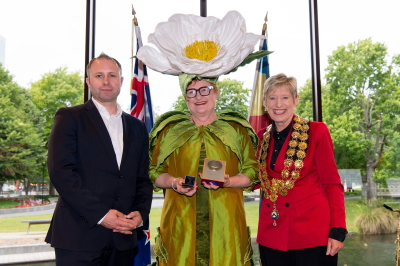 For generations, Christchurch has been known as the Garden City, and she is amongst the most pre-eminent promoters of that image, both at home and abroad, of this or any other generation. A passion for sewing, quilting and flowers led her into the world of theatrical costuming, an evolving path that over the years inspired her to produce exhibitions and performances.
For generations, Christchurch has been known as the Garden City, and she is amongst the most pre-eminent promoters of that image, both at home and abroad, of this or any other generation. A passion for sewing, quilting and flowers led her into the world of theatrical costuming, an evolving path that over the years inspired her to produce exhibitions and performances.
For over two decades she has designed, crafted and displayed her fabric floral creations here in Christchurch and overseas, receiving international attention and acclaim. She works with local students of design and with gardening clubs, freely sharing her rich treasure trove of knowledge. She is deeply involved in many festivals and events such as the annual Cancer Society Daffodil Day, the Summertimes Programme, the Ellerslie Flower Show, and the World of Wearable Arts extravaganza.
The Secret Garden display in Christchurch’s Botanic Gardens is a signal achievement that not only has rightly won her and her small but dedicated team a bouquet of plaudits, but has created a unique civic attraction. She has created, in her many projects, a world of colour and light, of texture and fantasy that has been and long shall be a welcome retreat for those who need a moment’s relief from day-to-day realities.
Keep Christchurch Beautiful Inc.
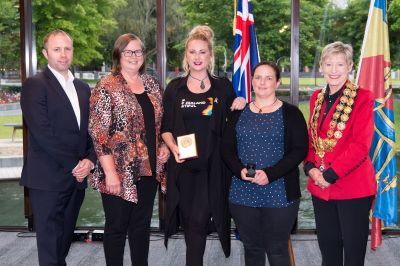 The organisation became an incorporated society in 2003, and a registered charity in 2011, but its roots extend far deeper than that, to the 1980s and beyond. Historically, it has focussed on the problem of litter, but over the years its purview has broadened to include environmental matters more generally. No more is it concerned simply with collecting and disposing of litter, but with the increasingly pressing problem of what happens to that litter after disposal, and the burnishing of the Garden City image. It is a well-run organisation with a long track record of achievement, at all times looking to improve and add to its effectiveness.
The organisation became an incorporated society in 2003, and a registered charity in 2011, but its roots extend far deeper than that, to the 1980s and beyond. Historically, it has focussed on the problem of litter, but over the years its purview has broadened to include environmental matters more generally. No more is it concerned simply with collecting and disposing of litter, but with the increasingly pressing problem of what happens to that litter after disposal, and the burnishing of the Garden City image. It is a well-run organisation with a long track record of achievement, at all times looking to improve and add to its effectiveness.
A key feature of that effectiveness is a willingness to be part of a collaborative network of community groups such as Lions Clubs that work together to create a cleaner, greener, more beautiful City. Through its Schools Environment Enhancement Programme (aka SEEP) it supports almost 40 local schools with ideas and resources, and has instilled a sense of civic pride and collective responsibility in tens of thousands of school children over several generations. It is an outstanding example of a great Christchurch organisation that works selflessly to achieve its goals, and in doing so makes an immeasurable contribution to our City.
Barry Andrew Scott
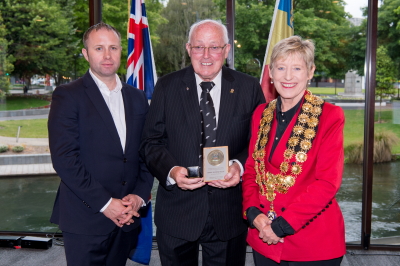 For nearly three decades he has been a member in good standing of the Lions Club at Christchurch South, and over that long period has participated in many community projects. They are too numerous to list, but special mention must be made of his untiring efforts in fundraising, particularly in the aftermath of the earthquakes.
For nearly three decades he has been a member in good standing of the Lions Club at Christchurch South, and over that long period has participated in many community projects. They are too numerous to list, but special mention must be made of his untiring efforts in fundraising, particularly in the aftermath of the earthquakes.
For a number of years now the administration of the Halswell Public Hall has been the centre of his attention, and its success and popularity as a public amenity has been in very large part due to his unremitting commitment. He holds the keys and checks the facilities between hires, taking bookings any day, at any hour of the day. Energetic and obliging, he has spent countless hours at Hall Committee meetings and on Lions Club business in general.
For many years he has assisted at Camp Quality programmes, helping children with cancer enjoy fun and companionship in a stress-free and caring environment where they can enjoy being children without the tensions and pressures attendant on their physical conditions. The people of Halswell, the people of Christchurch South, and especially children with cancer would be much poorer without his many years of dedicated service.
Judi Smitheram
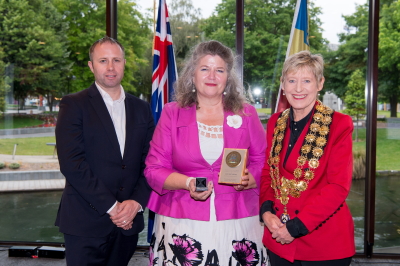 Folk music is the voice of the community, the voice that traditionally comforts the disturbed and disturbs the comfortable. It is the music that binds the generations together, the harmony that bridges ages, cultures and every social level. For the last four years she has been the Secretary of the Christchurch Folk Music Club, and President of the Canterbury Folk Music Festival, a task into which she has poured countless hours of dedication.
Folk music is the voice of the community, the voice that traditionally comforts the disturbed and disturbs the comfortable. It is the music that binds the generations together, the harmony that bridges ages, cultures and every social level. For the last four years she has been the Secretary of the Christchurch Folk Music Club, and President of the Canterbury Folk Music Festival, a task into which she has poured countless hours of dedication.
Thanks in large part to her commitment, the Festival is recognised within the world of folk music as a national event, attracting not only local musicians but artists from such faraway lands as Finland, Denmark, Ghana and Auckland. She is deeply involved in all aspects of the activities of the club and the festival, managing guests and finances, arranging catering, cleaning and accommodation, and organising children’s activities. Her love of folk music as an art form and as a vehicle for social connections is boundless, and infectious to all around her.
Always willing to do more, give more, and take less, she is adept at little touches, making working with her a joy, not only for her administrative skills but also for her baking and flowers. She is a truly outstanding woman.
Anne Stercq
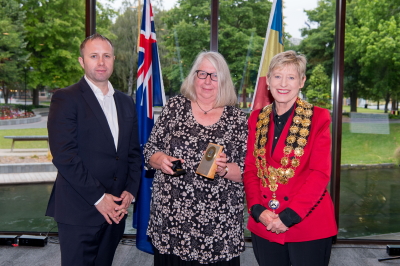 She is a registered psychologist with over thirty years of experience in the field of Specific Learning Disabilities (SLD), both in New Zealand and overseas. As Clinical Director of the Seabrook McKenzie Centre for over twenty-five years, she has been a major presence in the development of the Centre from its foundation in 1991 to the present day. She has generously given of her time, her knowledge, and her wisdom in so many ways.
She is a registered psychologist with over thirty years of experience in the field of Specific Learning Disabilities (SLD), both in New Zealand and overseas. As Clinical Director of the Seabrook McKenzie Centre for over twenty-five years, she has been a major presence in the development of the Centre from its foundation in 1991 to the present day. She has generously given of her time, her knowledge, and her wisdom in so many ways.
Under her guidance three significant projects have been brought to fruition: the development of a purpose-built facility for the Centre, the development of NZQA-approved courses for training teachers of students with SLD, and the establishment of the Jean Seabrook School for students with severe learning difficulties.
Her invaluable and unique contribution has enabled the Seabrook McKenzie Trust to meet its aims to support the education, employment, social development, legal rights and quality of life of people with SLD. She saw the work that needed to be done, and she did it, and all with little fanfare. Her legacy is the wise and patient capacity to nurture in others a high level of commitment to the cause of creating a level playing field in life-long learning for all despite their difficulties.
Philip (Phil) Tappenden
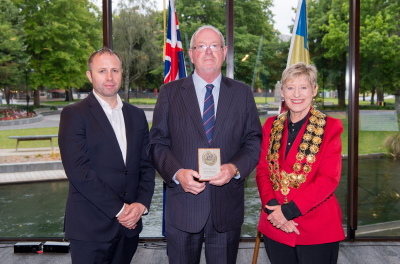 As New Zealand moves deeper and deeper into the Asian economic sphere, so it has become increasingly imperative that New Zealanders and Asians both learn more and more about each other’s societies. There is no better way to achieve such rapprochement than through face-to-face contact, contact that must begin at an early age. As both a member of the Songpa-gu Sister City Committee and Principal of Kirkwood Intermediate School, he has been uniquely well-placed to enable this contact.
As New Zealand moves deeper and deeper into the Asian economic sphere, so it has become increasingly imperative that New Zealanders and Asians both learn more and more about each other’s societies. There is no better way to achieve such rapprochement than through face-to-face contact, contact that must begin at an early age. As both a member of the Songpa-gu Sister City Committee and Principal of Kirkwood Intermediate School, he has been uniquely well-placed to enable this contact.
Over the past 14 years, he has worked tirelessly to build a relationship between the communities of Christchurch and Songpa-gu, a relationship that flows across all aspects of our societies; economic, educational, commercial, civic, cultural and personal. He has been instrumental in organising scholarships, and school and cultural exchanges. He has represented Christchurch in Songpa-gu on many occasions and has spared no effort to welcome delegations from Songpa-gu to Christchurch, to the point of personally hosting them and cooking for them in his own home – which the Mayor of Songpa-gu considered a highlight of her visit.
Always available, always approachable, always supportive, he continues his invaluable work as Honorary Consul for the Republic of Korea in Christchurch with the skill and patience for which he has become renowned.
David Charles Wilkinson
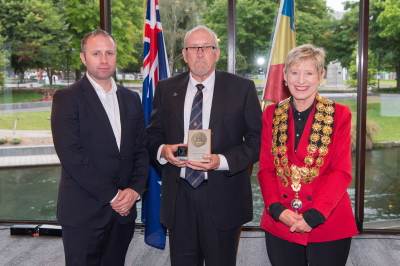 Collectively, violent crime, civil emergencies and acts of God have become a growth industry in Canterbury. Professional first responders are hard-pressed to cope, and this is where volunteer groups such as Canterbury Neighbourhood Support come into their own. David became Canterbury Area Co-ordinator in 2010, just in time for the worst civil emergency that Christchurch has ever suffered. After a three-decade career in law enforcement, he was well equipped to handle the disaster with confidence and professionalism.
Collectively, violent crime, civil emergencies and acts of God have become a growth industry in Canterbury. Professional first responders are hard-pressed to cope, and this is where volunteer groups such as Canterbury Neighbourhood Support come into their own. David became Canterbury Area Co-ordinator in 2010, just in time for the worst civil emergency that Christchurch has ever suffered. After a three-decade career in law enforcement, he was well equipped to handle the disaster with confidence and professionalism.
Over the ensuing years he has brought his considerable energies and experience to bear to the great improvement of the organisation, upgrading the communications system, giving CNS provincial coverage, and setting up a satellite station in Riccarton. He set up the Get Ready Grid, a system for getting the word out to all associated groups in the event of natural disasters or turbulent weather, and for the reporting of suspicious behaviour. He established Eye On Canterbury, a six-monthly mailout full of information and articles on the goings-on in Canterbury, and essential reading for anyone concerned with community safety. He is the embodiment of the sentiment expressed by the great JF Kennedy, ‘Ask not what your country can do for you, ask what you can do for your country’.
 Dr Maan Mustafa Alkaisi
Dr Maan Mustafa Alkaisi
When disaster strikes it is all too easy, and all too common, for the voices of the victims and of the bereaved to be lost amid the general tumult and affright. For the sake of his beloved wife, who was lost in the ruin of the CTV building, he could not allow that to happen.
Accordingly, he founded the Quake Families Group to ensure that the many little voices that individually could easily be drowned out were combined into one powerful one that could not be ignored.
He arranged for a lawyer representing the Group to attend meetings of the subsequent Royal Commission of Inquiry to ensure that the voice of the Group was heard. He worked with the Red Cross to help support the members of the Group, and with the Christchurch City Council to make sure that the CTV site was landscaped and beautified.
He works with the Council to campaign for better and safer building standards to ensure that the lessons learnt from the collapse of the CTV building are never forgotten.
Perhaps most importantly, in forming the Quake Families Group he has woven together, on the loom of shared tragedy, a large number of otherwise disparate strands into a company of lifelong friends.
 Ken Clearwater
Ken Clearwater
He became the full-time manager of the Male Survivors of Sexual Abuse Trust in Christchurch in 2001, but his involvement in the care of survivors goes back much further, and his title does not nearly describe the range and depth of his commitment.
He has worked tirelessly for thirty years with Male Survivors, not only throughout New Zealand but all around the world.
From Auckland to Otago, from Nelson to the Waikato, he has given unstintingly of his deep knowledge of sexual abuse and of the management of programmes to help those who have suffered from this pernicious evil. From the United States to Cambodia, from Norway to Uganda, he has advocated on behalf of Male Survivors, and for the networks that heal and support them.
Most importantly, he has helped to tear away the veils of silence that once kept this social shame from view, to reveal its hideous extent, and to allow men to leave the isolation and shame that was inflicted upon them.
He has built a community of men who share this common history and encourages all who join it to bring healing to others. A humble, open and easy-going man, he has been a warrior for and a true friend to all Survivors.
 Pat Duggan and Paul O’Connor
Pat Duggan and Paul O’Connor
If ever a date can be put upon the awakening of a national self-awareness, for New Zealand that date has to be April 25th. For one hundred and two years dedicated men and women have gathered to remember those who left New Zealand’s shores never to return.
For one hundred and two years, dedicated men and women have laboured long and hard to make this day a special one, and the planning and preparation for the annual Christchurch Anzac Day parade and service is complex, commencing many months before the event itself.
It requires coordination with the local government, all arms of the NZ Defence Force, the NZ Police Force, the emergency services, diplomatic and consular corps, central government, veterans’ associations, community and religious leaders and community groups.
As Chief Parade Marshal and as Master of Ceremonies respectively, they have been deeply involved in every aspect of the planning, preparation and execution of the event, representing a significant but gladly given sacrifice of time each year. Their contribution has been instrumental in ensuring that the annual commemoration, the largest in the South Island, runs smoothly, and with the dignity and respect that such a significant public event deserves.
 Coleen Dunlop
Coleen Dunlop
She has been an indefatigable volunteer worker for decades, with particular emphasis on the most essential area of refreshments.
She has done the catering for Age Concern Information Courses for fifteen years and for the monthly High Teas for people living on their own. She did all the High Tea catering for the Summer of Fun events for five years, a major operation considering that around a hundred people would attend each event.
She provides the refreshments for the activity groups that are run by the Wainoni-Avonside Community Services Trust on a weekly basis, which can involve up to sixty people, and to which folk come from all over Christchurch. She will frequently bring some of her own delicious home-baked goodies to these occasions, a contribution that is most greatly appreciated.
But her gift to the community is much more than the provision of provender. She is deeply aware of the pain that is felt by those whom age or infirmity has forced into isolation within their own houses, and at the age of eighty-nine continues to visit the elderly and the lonely in their homes in the spirit of one who represents the highest ideals of volunteerism and social service.
 Ruth Gardner
Ruth Gardner
She was manager of Volunteering Canterbury [VolCan] for over twenty years, and in that time ensured that the organisation became an integral part of the community support and social services systems in the city.
When the earthquakes rocked Christchurch in 2010-2011 she played a major role in the management and co-ordination of volunteer services across the city.
Despite VolCan losing its offices and all its resources, she kept the services offered by the agency operating first from her home within the cordon, and later from a series of temporary premises until the Community House was re-established. She rebuilt the resources that VolCan provides to its member organisations and was instrumental in ensuring the agency’s survival and subsequent growth while ensuring that it maintained its pivotal role in the facilitation and support of volunteering in the city.
Despite the constraints placed upon those who lived in the central city and who continued to live there during the period of the cordon and an almost total lack of resources, she managed to keep the flag of volunteering flying high during one of the darkest and most traumatic periods in the history of Christchurch.
 Jillian Meryl Lord
Jillian Meryl Lord
She has been a Friend of the Court Theatre for over twenty years and has served on the committee of St. Mary’s Church in Merivale.
She has held the chair of the Association of Anglican Women and, with her husband, Trevor, started the Canterbury Vintage Home Restorers’ Group, of which they are both still active members.
Her greatest fame, however, is her lifetime of outstanding service to the Family History Society of New Zealand. During her forty years of membership, she has held all positions of responsibility within the society, acting as President, Secretary, Treasurer, Researcher and, perhaps most importantly, as Librarian.
With an encyclopaedic knowledge of the history of Christchurch, and as a highly skilled researcher, she gives freely of her expertise to all comers, providing invaluable assistance for their genealogy projects and family history research. The society is particularly indebted to her generosity in allowing the society to use her home as a research centre, and she spends many hours each week working on the society’s projects, keeping the books, maintaining the library, purchasing new resources and helping with enquiries from the public.
In helping people to better understand their ancestry she is helping them to better understand themselves, and there can be few gifts greater than that.
 Maurice White Native Forest Trust
Maurice White Native Forest Trust
For more than seven hundred years the once dense tree canopy of Banks Peninsula was stripped away, first by early Polynesian fires, then by logging and the development of agricultural and pastoral farmland, until no more than one per cent of the ancient forest remained.
In 1987, thanks to the generosity of Maurice White, a trust was formed to create what is in effect a mini national park, privately owned but freely open to the public on foot. Its purpose is two-fold;
- to foster the natural regeneration of native vegetation and wildlife,
- and to allow the people of Canterbury to enjoy the reserve through the provision and maintenance of an extensive network of walking tracks.
For thirty years the Trust has actively worked to conserve and restore regenerating native bush for the long-term benefit of the environment.
Today, a steady stream of local schoolchildren are welcomed to learn about New Zealand’s unique faunal and floral heritage, and students from Lincoln and Canterbury Universities come for study and research. Visitors, local, national and international, walk the tracks, while researchers and scientists from around the world arrive to marvel and to study.
This is a mighty gift, not only to the people of Canterbury and New Zealand, but to their children, and their children’s children, and for generations beyond.
 Pauline Mohi
Pauline Mohi
She has worked with the Better Breathing (Pulmonary Rehabilitation) Consumer Group of the Canterbury Clinical Network to improve care for people with lung conditions for a number of years. During that time, and to a very large extent due to her efforts, the approach to community care for people with lung conditions has altered markedly for the better.
For five years she has been spreading the word about Chronic Obstructive Pulmonary Disease (COPD), advocating for better health services, lobbying for lower health fees, encouraging people to take more responsibility for their own health, and raising awareness of the social repercussions of COPD within the medical community.
She has actively participated in respiratory and pulmonary rehabilitation governance groups, bringing a crucial consumer perspective to the table, and has contributed invaluable insights to other groups, such as the Canterbury Pharmacy Service Review, who are involved in health service design.
The Coffee and Exercise Groups that she instituted are very popular and growing in number. As a result of her crusade not only are there fewer hospital visits for those with respiratory disorders, saving many thousands of health budget dollars and freeing up more beds, but the people themselves are healthier and more active.
 Katherine Peet
Katherine Peet
For forty years she has been a tireless advocate for social justice, bringing to bear her very considerable educational, analytical and administrative skills to a wide range of agencies in the non-governmental organisation, not-for-profit and voluntary sectors.
She has been a member of the Canterbury Workers’ Educational Association since 1977 and has served as Canterbury President, National President, and Special Representative at UNESCO conferences. She is the driving force behind the organisation in matters of both governance and day-to-day administration.
She is an organiser and workshop leader with Network Waitangi Ōtautahi and is Tangata Tiriti co-chair of One Voice Te Reo Kotahi. She has been an active member of Adult and Community Education Aotearoa since 1977, and of the Council of Social Services [now the Social Equity and Well-being Network].
She has spearheaded many more causes and groups as diverse as the Women Against Violence Centre, the Christmas Without Commercials Campaign and the Addington Railway Workshops Male Voice Choir.
She has committed over four decades to the enrichment of the lives of the citizens of Christchurch through the provision of a wide range of educational opportunities and experiences. Hers has been a life spent fighting for social justice, empowerment of the powerless, and positive social change.
 Stephen Leslie Phillips
Stephen Leslie Phillips
He has been a diligent volunteer for different organisations for more than thirty years, providing vital assistance to many community groups by providing a professional standard of governance and the auditing of accounts.
He has been a board member of Age Concern Canterbury since 2014 and a Trustee of Age Concern Canterbury Trust since 2016. He has been an Independent Trustee of Ōtautahi Community Housing Trust, an agency that manages a housing portfolio of over 2400 units, since 2016.
Other involvements include Deputy Chair of the Canterbury District Health Board Consumer Council, Member of the Canterbury District Health Board Clinical Board, Trustee of the Canterbury Health Care for the Elderly Education Trust and three years as Facilitator and Panel Member on the Christchurch Community Justice Panels [now known as Iwi Panels].
A Justice of the Peace since 1996, he has been an active worker within the Canterbury Justices of the Peace Association for many years, as Councillor, Vice President, President and Past President.
A consummate professional, he has at all times endeavoured to instil his own high standards of professionalism and organisational governance into the agencies that he has served so that they in turn may better serve their communities.
 Robert (Bob) Arthur Shearing
Robert (Bob) Arthur Shearing
To say that he has been a dedicated worker for the Riccarton-Wigram area for many years is an understatement, for his contributions to the community have spread right across the City of Christchurch.
His involvements over the last two decades and more have been legion: City Councillor and Community Board Member for fourteen years, and a key governance member of numerous boards across the City.
He is a Board Member of The RNZAF Museum Trust Board and of the Christchurch Racecourse Trust Board, and a Trustee of the Templeton Welfare Council, the Riccarton Bush Trust and the Paparua RSA Poppy Trust. He is Chairman of the Enrich Community Chaplaincy Trust, the Hei Hei Broomfield Community Project Trust and the Rose Historic Chapel Trust.
He is an astute and hard-working committee member and a man of seemingly unlimited and infectious optimism. He seems to be here, there, and everywhere, now advocating for a cause before a submissions committee, tomorrow helping out with the local ANZAC day parade, then organising youth volunteers at the local Hello Hornby event.
He is widely known and admired not simply as an inspiration to all but as a great bloke who gets involved and pitches in wherever and whenever he can.
Kendra Burgess-Naude

As always, the recent 2017 general election campaign gave rise to a chorus of comments on the lack of political interest amongst younger people, a malaise diagnosed as arising in large part from a feeling in many individuals that their vote cannot make a difference. Even as a pupil at secondary school she was passionately engaged in projects to raise political awareness amongst her classmates, talking to them individually and in groups, explaining the importance of the democratic process and encouraging those who were turning eighteen to enrol.
Now a full-time University student, she continues her crusade as co-chair of the Christchurch Youth Council, supporting and mentoring others, empowering them to engage with local and central government processes, to engage with decision-making, and to realise that they can shape the City and country in which they live.
Through her work with the Youth Community Voices project she encourages young people to form groups within their Wards, and to work with Community Boards and with the City Council to ensure that young people are represented, and their voices are heard. Her outreach encourages her peers to engage in active citizenship that they may lead more fulfilled lives.
The Canterbury Children’s Theatre

For sixty years the Company has brought pleasure, entertainment, and excitement to the children of Canterbury, and, indeed, to many adults. Times have changed, but the Company has changed with the times.
The days when bus-loads of children would arrive from Timaru or Hanmer Springs to packed houses at the Repertory Theatre are long gone, the victims of television and a whole constellation of electronic gadgetry, but the magic continues at the Malthouse Theatre in Beckenham. Indeed, their involvement with children goes beyond their primary concern, the presentation of plays and shows for the entertainment of youngsters.
In association with the Malthouse Theatre Trust they introduce children to the subtle arts of theatre and stage work, providing an environment where aspiring young actors and actresses can enter the craft at an elementary level and gradually progress through to more adult techniques and themes. Most importantly, the Company provides the wherewithal to hone young imaginations, and sows the seeds of dreams that can last a lifetime. That children who were involved in the early years, now grandparents, still attend performances with their grandchildren should prove beyond any doubt that magic still exists in Canterbury.
City Harvest Food Rescue

New Zealand is a fertile land, rich in food. So rich is it that New Zealanders can afford to throw away up to one hundred and twenty thousand tonnes of food each year. Paradoxically, and to our shame, more than a quarter of a million New Zealand children go to school each day without breakfast, or to bed without dinner.
They saw this burning need with great clarity, and set up an organisation to rescue quality surplus food from the supply chain and redistribute it to people in need, ensuring that hundreds of needy Cantabrians have access to quality meals and at the same time helping to reduce waste. In collaboration with twenty-four charitable agencies such as the City Mission, St Vincent de Paul, Women’s Refuges, the Pasifika Fellowship, and many others, the team of volunteers runs a six-days-a-week operation to provide food resources to front-line groups.
Their success speaks for itself: although founded only in February of this year, after only five months of full operation nearly twenty-three tonnes of food had been rescued and redistributed, providing nearly sixty-five thousand meals and reducing landfill disposal by some eighteen tonnes. Words cannot adequately express the enormity of their achievement.
Friends of the Akaroa Museum

The unique character of a place is a quality that is built upon its many-layered history. But the past is a fragile creature, easily mutilated, quickly forgotten, were it not for the dedicated work of a few far-sighted individuals who can see beyond the exigencies of today into the needs of tomorrow. Such a group came together on the 21st of June, 1965, to support the Akaroa Museum by providing financial assistance, and voluntary help in building up the collections.
Fifty-two years later they are still at it, fundraising, catering, cleaning, training volunteers, and performing the multitude of tasks that need to be done to keep the museum open, interesting, and relevant. They are on hand to receive the thousands who walk through the museum’s doors every year, to assist the school groups that regularly visit, or to advise those who come to research family histories.
They preserve and bind copies of the Akaroa Mail, an invaluable archive of local history, and maintain the Oral History Project, an undertaking that ensures that the experiences, wisdom and lore of local residents are forever a part of Canterbury’s legacy. They are our collective memory, preserving for tomorrow that which made Canterbury what it is today.
Derek Errington McCullough

He has been a member of the Mt. Pleasant Community Centre and Residents’ Association Incorporated for twenty years, serving on the fundraising committee since 2011, and as President of the Association since 2014.
During this, the most traumatic period in its history, he has worked assiduously to ensure that a continuous programme of community engagement and activity has been maintained, and he has been central to the development and restoration of the Community Centre. Over the past six years he has given hundreds of hours to the effort to get the Centre back up and running, drawing on his vast experience of events management over the past three decades.
Thanks in large part to his gift of time, his efforts, and his devotion, the Mt. Pleasant Community in particular, and the City of Christchurch in general, have a fine new venue to house a wide range of classes, meetings, seminars, celebrations and social gatherings. Thanks to him, the Community and the City have before them an exemplar of what may be achieved, even in the most extreme of situations, with perspicacity, persistence, and perseverance.
Bruce McEachen

When the dust of the 2011 earthquakes was beginning to settle, there came a call to build a memorial to those who had lost their lives in the disaster. Thus the Canterbury Earthquake National Memorial Project was called into being, and to its team of professionals there was added one more, the only unpaid member, a representative of those directly affected.
He became a key member of a number of groups who oversaw the selection of the design and the construction of the memorial, and the events around its opening.
Temporarily putting aside his own grief at the loss of his son, Matthew, he worked alongside his colleagues to assess and select design submissions, following developments to ensure that the original intent of the memorial was maintained, and was deeply involved in the ceremonies and public events at the opening. He gave many hundred of hours of his time over the nearly three years of the project’s duration, all the while maintaining full time paid employment outside the project.
A tower of strength, humour and humanity, he has given more to the City than any parent should have to give and there is no doubt that the memorial would not be what it is, but for his efforts.
Leith Ellen McMurray

There are around 4,000 people in Christchurch who are affected by it, yet for many years, and still, to a large extent, today, Asperger’s Syndrome was and is poorly understood by many professionals in the education, disability and medical services.
Diagnosed later in life as being within the autism spectrum, into the milder end of which Asperger’s Syndrome fits, she knew first hand both the difficulties of those who suffer from this often debilitating disorder, and of the lack the help that they needed. She was immediately aware that someone would have to do something, and that that someone was her.
The result was Aspiehelp, The Aspire Trust, a peer support, social work and advocacy service for people affected by Asperger’s Syndrome. For six years she and a small team of dedicated colleagues have built up and refined their group into an effective and highly valued service that provides pre- and post-diagnostic consultations, and a social-work service of counselling, advocacy and referrals to specialist agencies. As well as this most welcome practical assistance, under her visionary leadership the group promotes understanding of the condition that in turn alleviates anxiety and depression and helps those affected by the Asperger’s Syndrome, to develop into happy and productive members of society.
One Mother To Another Charitable Trust

Mothers and carers of children who enter Christchurch Hospital’s Children’s Acute Assessment Unit, and mothers who have babies admitted to the Neonatal Intensive Care Unit, undergo an experience that is at best stressful, and may also be deeply frightening.
Doctors and nurses sometimes have to perform procedures that upset not only the children but the parents as well, as the little life so often hangs in the balance. As a consequence of a terrifying experience of her own, Christina conceived the idea of providing others in a similar position with a little morale boost.
Together with her friend Joy, with the occasional help from others and the support of the local business community, they put together a number of gift packs to be given out to suitable recipients. Each pack is filled with items, some practical, some indulgent, and includes a hand-written note to let the recipient know that she is not alone. From small beginnings, the group are now able to supply fifty packs per month, which are distributed by nursing staff. Their aim is to put a smile on the face of every mother or carer, to let them know that someone cares about what they are going through, and hopefully brighten their day.
Parafed Canterbury

For fifty years it has provided sporting and recreation opportunities for Cantabrians with physical disabilities, and leads the country in the services that are offered to the community. It has materially advanced the rich sporting history of both Canterbury and of New Zealand as a whole, making a significant difference to the lives of many people. It has created pathways for thousands of the physically disabled to reach sporting goals, creating leaders, role models and inspirational stories that continue to echo down the generations.
It offers a vast range of programmes that cover the full spectrum of organised sports from para-athletics, to para-cycling, to wheelchair rugby, as well as ancillary programmes such as an academy course for developing and supporting elite athletes and coaches, and educational presentations to business and tertiary education organisations.
Although catering for all age-groups, it places heavy emphasis on young people, and the work done with this demographic has seen increases in participation levels in school sports as well as building a self-confidence in young people that extends beyond sports to all areas of life. By ensuring that the disabled have the same opportunities as the able-bodied it has substantially enriched the fabric of the lives of all Cantabrians.
Bishnu Pokhrel

The transition from one society to another is always fraught with difficulties. An unfamiliar language, cultural norms that can vary widely from those of the ‘old’ society, strange foods, different ways of doing almost everything, can impose enormous stress on the new immigrant.
Equally difficult is the lot of the children of migrants who face the prospect of being ‘lost’ within the new society, losing their own language, their own culture, their own ancient traditions, but not yet fully integrated into the new culture. A champion community worker, he has spent the last ten years working for people of Nepalese and Bhutanese backgrounds to settle into and acclimatise themselves to Canterbury’s culture.
He has worked extensively to bring this community together and to protect their unique culture and traditions. He is a mentor, the go-to person for any in the Nepalese or Bhutanese community who need help or advice. He has earned huge respect through working with different government agencies and service providers, and has co-ordinated dozens of events showcasing Nepalese and Bhutanese culture, tradition, and cuisine, to the wider Canterbury community. His door is always open to anyone seeking help.
Anthony John Tizzard

A large number of charitable bodies sprang to the aid of those left in need in the wake of the Canterbury earthquakes. A leader amongst these groups was the Christchurch Earthquake [Rotary] Charitable Trust. On its formation he was invited to share his skills and experience as Secretary/Treasurer and Trust Member, and it is impossible to quantify the number of hours he has spent on the unromantic but vital tasks of collating applications, preparing responses, checking Trust requirements, confirming finances and attending to all pertinent correspondence.
His good offices have been central to the effective management and operation of the Trust, as a result of which millions of dollars in funding have been distributed throughout Canterbury. The beneficiaries of this great labour are too many to itemise, but they number in the hundreds and include a wide range of local community groups such as schools, youth organisations, people with disabilities, the elderly, early childhood organisations, and community facilities.
Although many groups and individuals have also been involved over the years, it is with gratitude that the community recognises that his time, dedication and skills, given without hesitation or reward, have been pivotal to the success of the Trust.
Roy Sinclair

For years he laboured to have a Peace Bell brought to New Zealand and installed in Christchurch. To this end he founded the New Zealand Chapter of the World Peace Bell Association. He travelled to Japan on several occasions at his own expense, appearing on television and in newspapers, visiting war memorials and attending civic events. In 2004 he and his partner undertook an epic 3200k bicycle ride from one end of Japan to the other, all in the name of the promotion of the World Peace Bell Movement.
His untiring efforts, as well as countless hours of fundraising by members of the Chapter, saw this dream finally realised on 3 October 2006, when the Christchurch Peace Bell was formally unveiled in its pavilion in the Christchurch Botanic Gardens.
His gift is all the more poignant today as, even as these awards are taking place, chest-beating militarists armed with weapons of horrendous power threaten to topple the world into nuclear apocalypse. Thanks to his gift, however, Christchurch has at its heart a haven where a mighty symbol of tolerance, regeneration and international harmony lies amid flowers, shrubs, ponds and trees.
304th Expeditionary Airlift Squadron United States Air Force

Their primary mission is the provision of logistical support to the United States’ National Science Foundation facility at McMurdo Base as part of Operation Deep Freeze. In tandem with this they have provided support for numerous Christchurch charities, drawing largely on the widespread interest in the giant C17 Globemaster aircraft, and the ongoing local fascination with all things to do with The Ice.
The Globemasters have been flying in and out of Christchurch since 1999 and during that time the Airmen who fly them have raised many thousands of dollars for local, largely children’s, charities.
They run a small shop, from which they sell United States Air Force and particularly C17 themed items such as t-shirts, coins, posters, hats and stickers, and have undertaken many fundraising events in which tours of the cavernous Globemaster aircraft have loomed large. The Cancer Ward at Christchurch Hospital and Kids Can (Canterbury) have both benefited from this plethora of generosity, as well as the NZ Red Cross, Kidney Kids of New Zealand, Cookie Time Charitable Trust, the Christchurch City Mission, the St. John Ambulance, and the Cholmondley Children’s Home. They have been most generous benefactors of Christchurch and Canterbury, as well as worthy and welcome ambassadors for their Service and their Country.
Akaroa Lighthouse Preservation Society

Heritage buildings, those that tell the tale of the journey of a community across the years and the generations, are few and fragile, ever vulnerable to the vagaries of nature, the depredations of political agendas, and the prospect of the ‘quick buck’.
It takes a sturdy and determined group to protect these delicate and endangered creatures from destruction and exploitation, and diligence and perseverance to maintain them over time. Such a group formed around the Akaroa Lighthouse in 1979, undertaking not only to save it from almost certain destruction but to move it complete with all its esoteric equipment from its original home on the desolate harbour heads to its present location close to Akaroa village.
For almost four decades this hardy band of local enthusiasts has worked to ensure that this, the last fully operational 19th Century lighthouse in the South Island, is kept in working order for the delight and edification of future generations. They have given many thousands of hours of work, and raised many thousands of dollars to that end. The Lighthouse, unique in Canterbury, is now a key feature of the village scenery, enjoyed by tens of thousands of schoolchildren, tourists and visitors every year. At a purchase price of $1, it must surely rank as the best bargain that the heritage movement in Canterbury has ever made.
The Christchurch Community Response Volunteers

The earthquakes of September 2010 and the subsequent months and years served to highlight many weaknesses in the fabric of society, one of which is that many people live alone.
The highly mobile and fragmentary nature of modern civilization means that large and increasing numbers of households consist of one person, and when disaster comes this can have tragic consequences. Several groups of people, largely in the east of the city, recognised this problem very early in the piece and in March of 2011 formed a collaboration to undertake a door-knocking exercise to check on people's well-being.
Although initially established as a result of the earthquakes, its role has evolved over time to include the whole metropolitan area, not just those parts where significant damage occurred.
To date they have visited over 70,000 homes and have provided assistance to more than 4,000 people, mainly the elderly and otherwise vulnerable, directing them to various helping agencies and community groups, alerting community workers to problem areas, and even doing little handyman-type jobs such as freeing up stuck doors or straightening up clotheslines. They are giving back that which too many have lost – a place in the community.
David Leonard Ching

On being approached in 1996 to set up a Conductive Education facility at Addington School, he embarked upon a course that would become a passion. Over the ensuing years he became ever more deeply involved in the provision of holistic education for children with motor disabilities, a curriculum that involves the specialised teaching of skills that most people take for granted.
He served as a member of the NZ Foundation for Conductive Education, later becoming Chairperson. As such he was instrumental in promoting the practice of Conductive Education throughout New Zealand, raising official and sponsorship awareness not only of Conductive Education but of all special needs teaching.
On retiring as Principal of Addington School in 2005 he worked for the Foundation, becoming National Co-ordinator. A lifelong rugby union enthusiast he has for nearly three and a half decades been associated in a number of capacities with the Canterbury Rugby Union: Committee Member and Archivist, Canterbury Primary Schools' Association Deputy Chairman, Chairman, Selector and Manager. His involvements and achievements in and on behalf of so many fields, be it education, or rugby union, or primary school sports, are too many to enumerate. Dedicated, conscientious, selfless, he has established a benchmark for service to his community that is extremely hard to surpass.
Professor Hong Hu

The last few years have seen an exponential increase in contacts between New Zealand and China. Trade and tourism have grown enormously and can only continue to grow. It is essential, therefore, that mutual understanding between the two should also continue to grow, and she has played a key role in that facilitation since she arrived in Christchurch in 2010.
Through her work with the Confucius Institute, she has been instrumental in the nearly ten-fold increase in the number of local High Schools that teach Mandarin. She has organised workshops and seminars on Chinese culture, and events such as the NZ Chinese Film Festival.
At all times she has acted above and beyond the call of duty. Although the first earthquakes occurred within months of her arrival to take up her position at the Confucius Institute, and although advised by the Chinese authorities to leave the city, nevertheless she refused and stayed to play an invaluable part in the recovery activities of the University of Canterbury, as well as helping the Chinese Embassy to care for local Chinese victims. Throughout her stay in Christchurch she has exemplified the virtues of generosity, diligence, sincerity and loyalty such as would make the Great Sage himself proud.
Independent Fisheries

A commercial enterprise is more than simply an engine to create products for sale. A commercial enterprise is an entire piece of the complex jigsaw of society, and its activities have ramifications and influences far beyond its immediate mercantile function. Since 2005 this enterprise, at considerable expense in time and money, has been supporting and funding an exchange programme for students with disabilities between Christchurch and Kurashiki in Japan on alternate years.
In one year two students, one with a physical disability and one with an intellectual disability, together with their caregivers and a team leader from Kurashiki visit Christchurch. In the following year, a similar group from Christchurch will visit Kurashiki.
The programme enables young people who would otherwise never know such a thing to experience first hand the people and culture of another country, and to learn what their overseas counterparts are doing to improve the lives of their own people with disabilities. They come home full of new ideas and new enthusiasm, having gained understandings far beyond their previous horizons, and are thus infinitely better equipped to participate in the decision-making processes of their respective societies. The programme is an outstanding example of good corporate citizenship, and a fine challenge for all to emulate.
Ira Mitchell-Kirk

Most artists seek support from their communities. An established artist and teacher of art, she has turned that equation around, using her art to support her community. Over the years she has given works of art and countless hours of her time to the benefit of numerous charities in the Greater Christchurch area and the Canterbury region.
Her paintings, bright, colourful and impressionistic, are in popular demand, and proceeds from their sale go regularly to boost deserving coffers. For AVIVA family violence services in Linwood she designed and painted a delightful jungle mural for the children’s room.
Donated artworks sold at auction have raised funds for the St. Andrew’s rowing and hockey teams, Christchurch Home and Families, and Ohoka School. One painting sold at auction raised enough money to fund almost two Mondiale LifePod Incubators that could over their lifetime could save the lives of up to a thousand babies. She raised $50,000 for local services through the sale of her five giraffes in 2015, and auctions of other works have benefitted the Transplant Games organisation, Cashmere High School, Ronald McDonald House, Beckenham School, the Christchurch Charity Hospital and others too numerous and varied to enumerate. Her generosity is matched only by the beauty of her creations.
Josiah Tavita Tualamali’i

For many young people, becoming involved in public affairs and the democratic process is seen as complex and daunting. This is true for all, and even more so for those who come from those minority cultures whose ways of life may be very different from those of mainstream New Zealand. From the age of fourteen he has immersed himself in community and youth groups, speaking the language of young people in a way that young people understand.
As a student of law at the University of Canterbury he been able to augment his natural affinities and abilities with the knowledge, skills and critical thinking that legal training brings to the student. He is Chairperson of the Pacific Youth Leadership and Transformation Council Charitable Trust, a Pasifika Youth Guide, a member of the Student Well-being Advisory Group at the University of Canterbury, Student Representative on the University of Canterbury Pacific Strategy Board, Youth Representative on the Pegasus Health Pacific Youth Reference Group, Community Representative on the Christchurch City Council Multicultural Strategy Working Group, and other positions too numerous to list.
He is a community leader, a youth leader, an activist, an educator, an enabler, an advisor, and a communicator. Above all, he is the future.
